Henry Reason's Game of Parliament 1886
- Peter Berthoud
- Sep 22, 2023
- 5 min read
Updated: Dec 20, 2023
"Much Fun! Easily Played, Great Excitement"
The Game of Parliament is a rare Victorian card game by Henry Reason. It features a gallery of unique political caricatures by an unidentified artist.

Henry Reason's Game of Parliament - Box Lid
The game contains forty-six cards, each one a unique caricature of a recognisable 19th Century British politician. Each cartoon portrait is complimented with a satirical adaptation of that politician's name. The cards also bear a value, reflecting the influence of the parliamentarian within their party.
The aim of the game is described in the rules:
"In this game the players form a MIMIC PARLIAMENT by making two equal sides, LIBERAL and CONSERVATIVE.
Each side strives to pass all the laws on its programme before the other."
Each side has its own programme of six Laws that must all be passed to secure victory. One of the Conservative Party political objectives is to pass "A Law to make every man mind his own business", one Liberal Party imperative is to secure "A Law to give a vote to every one's hobby-horse".
Each law is passed or fails according to a "vote". Members of each party's team play one politician card and the values marked on each of their cards is totalled and weighed against the total values played by the opposing party. The team in government proposes laws and the government changes when votes are won by the opposition.
Victory, when it eventually reveals itself, is total, as each party's sixth and final law ensures the abolition of their opponent's entire party.
Both programmes of laws and every politician card are reproduced below.
Beneath these I have also included some notes on the context of the game and the names and details of all the politicians depicted.
The Twenty-Three Conservative Party Members:

1 Baron De Caterpillar, 1 Sir R. Fowlingpiece, 1 Sir Robert Peeler, 2 Lord George Jamilton
2 Lord Charles Bearsfood, 2 Mr Asheap-Tartlett, 3 Mr C. Larke, 3 Lord Kytton
4 Sir H. Rum-Old Wolff, 4 Col. Manley, 4 Rt Hon J. Shout-Louder, 4 Sir John E. Cost

5 Sir R. Good-Templar, 5 Lord Crambrook, 6 Mr Prison Chaplain, 6 Lord Carnt-Have-None
7 Lord John Tanners, 7 Rt. Hon. Railway Bookstall, 8 Sir Richard Touchy, 9 Lord Diddlesleigh
10 Sir Michael Thick-Speech, 11 Lord Random Judge-ill, 12 Lord Salisbury-Plain

The Conservative Programme:
A law to make every man mind his own business.
A Law that no Prime Minister wear a collar more than 12in. high.
A Law to let well alone and ill also.
A Law to muzzle all snarling members.
A Law that the sea shall be calm when Lords of the Admiralty sail.
A Law to abolish the entire Liberal Party.
The Twenty-Three Liberal Party Members:

1 Mr Charles Badlaw, 1 Mr Party Knell, 2 Mr Labby-Truth, 2 Duke of Bargyll
2 Lord Chimberley, 3 Mr Joseph Cowpen, 3 Mr Joseph March, 3 Lord Alehousie
3 Baron Brothschild, 3 Lord Darby-Day, 4 Rt Hon. A.J. Umbrella, 4 Rt. Hon. Land-of-Goshen

4 Viscount Crampden, 5 Lord Southbrook, 6 Lord Dog-Rosebery, 6 Rt. Hon. Ugh Chilloff
7 Rt Hon. I'm Right, 7 Lord Half-Hartington, 8 Sir W. Verynear Halfcourt, 9 Lord Grannysill
10 Rt. Hon. J. More-Or-Less, 11 Rt. Hon. Orchid Chain-Em-In, 12 Rt Hon. W.E. Grindstone

The Liberal Programme:
A Law to compel all Red Herrings to grow without bones.
A Law to prevent members from sitting on other members' hats.
A Law to take the land from the Landlords, and give it those who shout the loudest.
A Law to sell all bachelors over thirty-five by Public Action.
A Law to give a vote to every one's hobby-horse.
A Law to abolish the entire Conservative Party.
Topical games have a limited shelf life. The more up-to-date they are when first published, the more out-of date they will seem shortly after. Any game based on parliamentary politics has particular problems to contend with, the inevitable toll of deaths, elections, resignations, promotions and ennoblements will quickly erode topicality.
In early 1886 Henry Reason's Game of Parliament was bang up-to-date, incorporating newly elected MPs from General Election of 24 November to 18 December 1885. But Reason's heart must have sunk when another General Election was called for 1 to 27 July 1886, knowing that by the 28th July his brainchild would soon be old hat.
In modern terms it would be almost equivalent to a games designer publishing a new parliamentary card game a few days into Liz Truss's Premiership.
The extreme rarity of the game today probably reflects both a very limited production run and the rapid onset of the game's irrelevance to those who had already purchased a copy. As Sir Michael Jagger once observed "Who want's yesterday's papers? Nobody in the world.". Many of the few copies that were produced were probably lining proverbial budgie cages shortly after.
Over 130 years after its publication I was delighted to find and purchase a copy of this obscure game. I wasn't sure what to expect from it, unusually there were no images of the cards available online and virtually nothing seemed to have been written about it.
Once out of the box, of the 46 caricatures, initially only a very few familiar faces presented themselves. The rest of the cards were a mass of macassared beards, moustaches, sideburns and unintelligible puns. I set out, mouse in hand, to establish exactly who was represented on each card .Gradually I was able to positively identify all bar one of the politicians and found that I could begin to appreciate many of the jokes and puns.
As I spent many hours working my way through the pack, I started to realise what a unique snapshot of late-Victorian British politics the game's caricatures provide.
The uncredited artist who drew the cards was clearly talented and may be well known for other similar work. If you think you know the artist's name, please drop me a line.
Below I have provided the full names and very brief biographical details of all the politicians depicted. In almost all cases there is also a link to other portraits of the same subject, as held by the National Portrait Gallery.
Conservatives
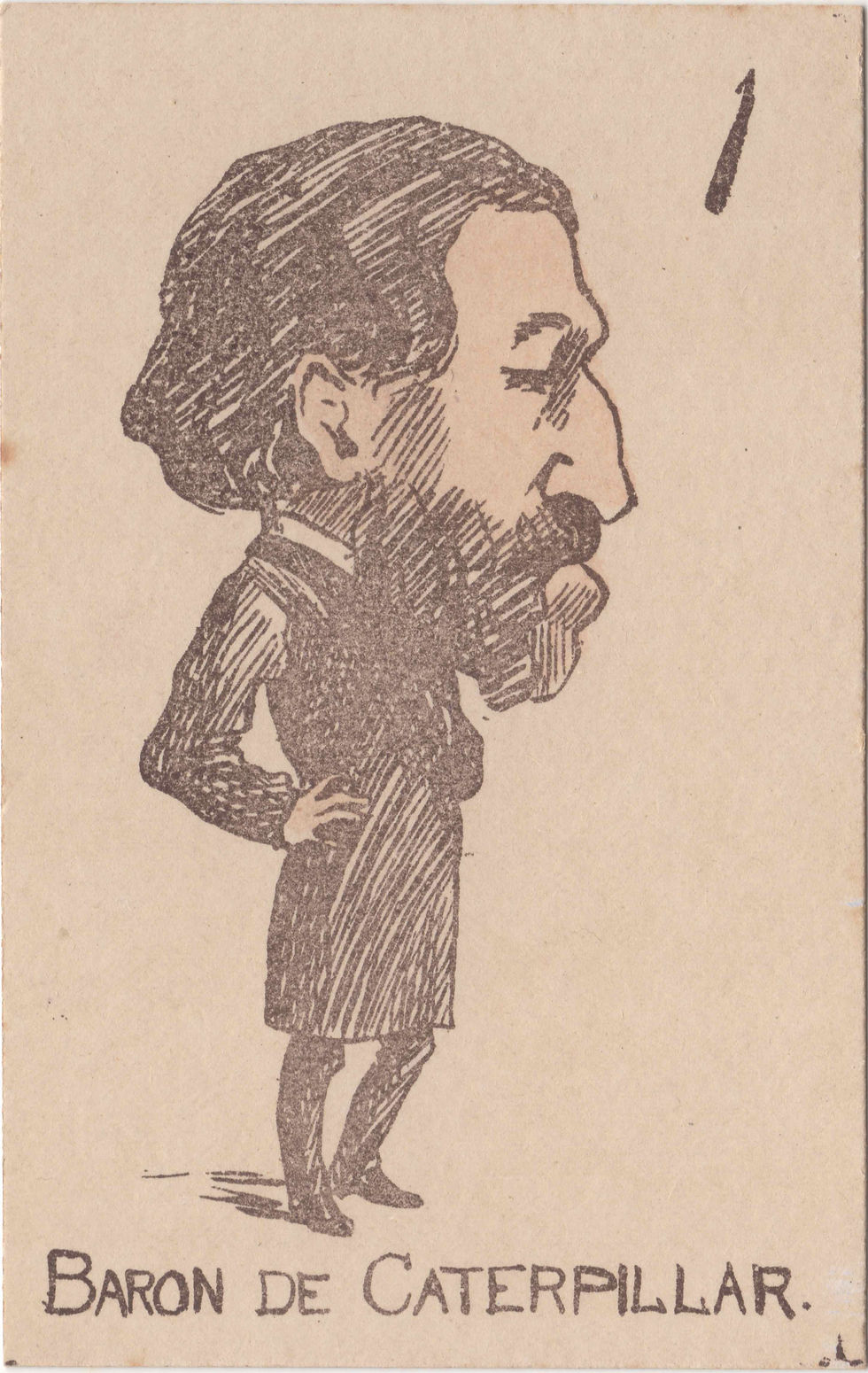 | 1 Baron De Caterpillar Henry de Worms, 1st Baron Pirbright (1840-1903) Known before his peerage in 1895 as Baron Henry de Worms. MP for Greenwich from 1880-1885 and for Liverpool East Toxteth from 1885-1895. Parliamentary Secretary to the Board of Trade from 1886-1888 and Under-Secretary of State for the Colonies from 1888-1892. |
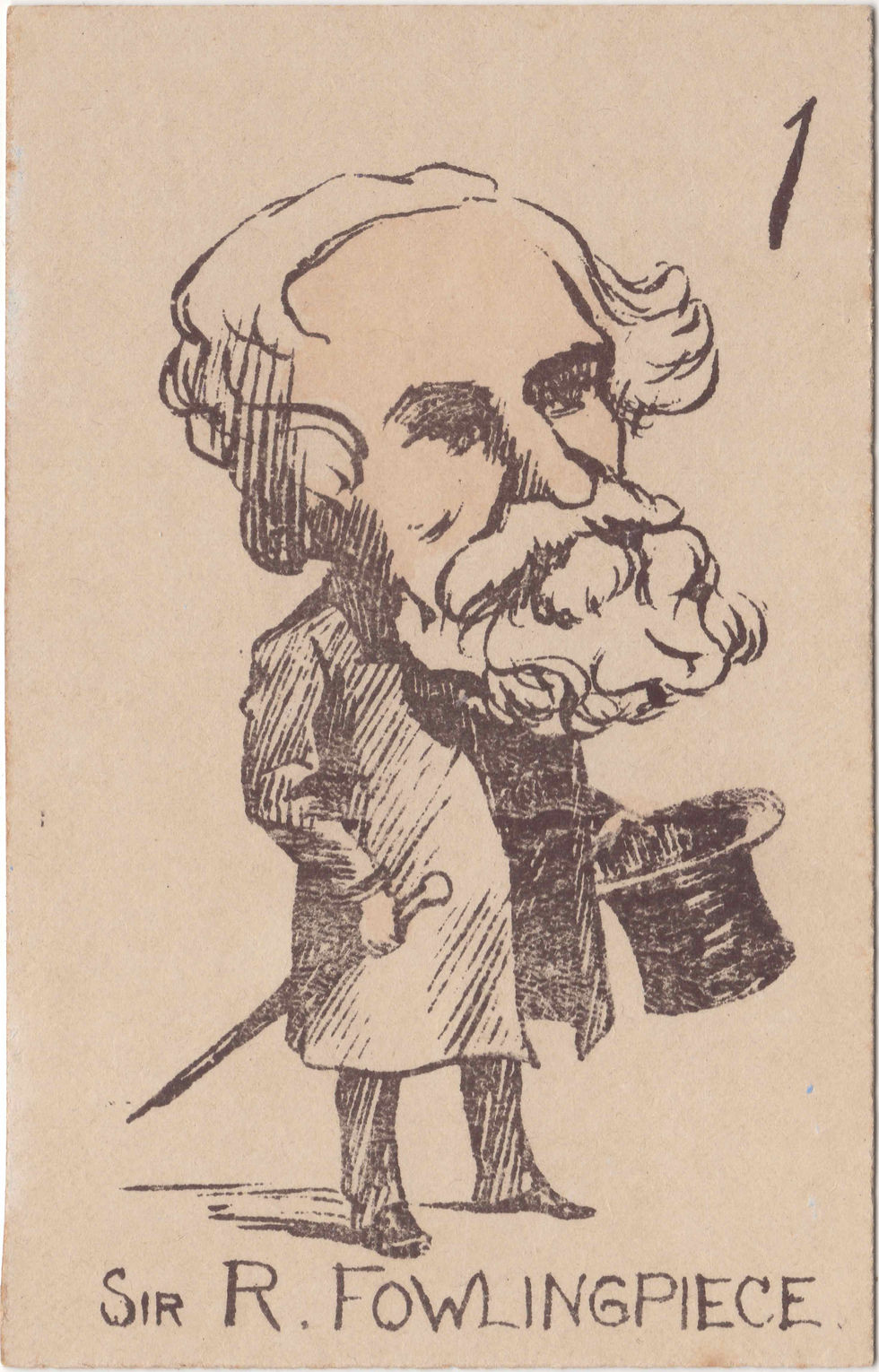 | 1 Sir R. Fowlingpiece Sir Robert Fowler, 1st Bt (1828-1891) MP for the City of London (1880–1891). Sheriff of the City of London for 1880. Lord Mayor of London in 1883 and 1885. He was created a baronet in 1885.
|
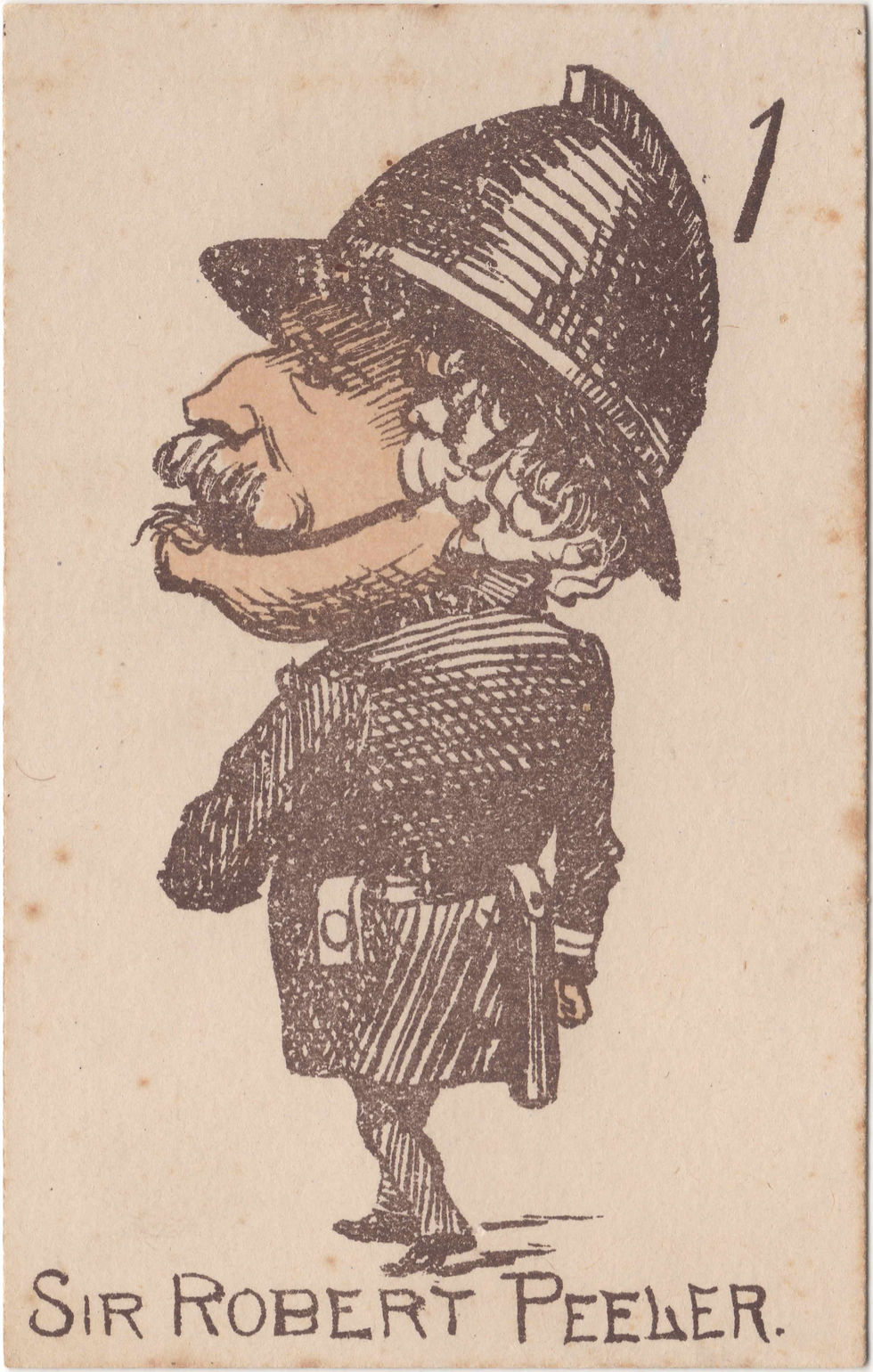 | 1 Sir Robert Peeler Sir Robert Peel, 3rd Baronet (1822-1895) Eldest son of Prime Minister and founder of the Metropolitan Police Service, Sir Robert Peel 2nd Bt. Peel Junior served as an MP for his father's constituency, Tamworth, from 1850 until 1880, for Huntingdon in1884 and for Blackburn 1885-1886. |
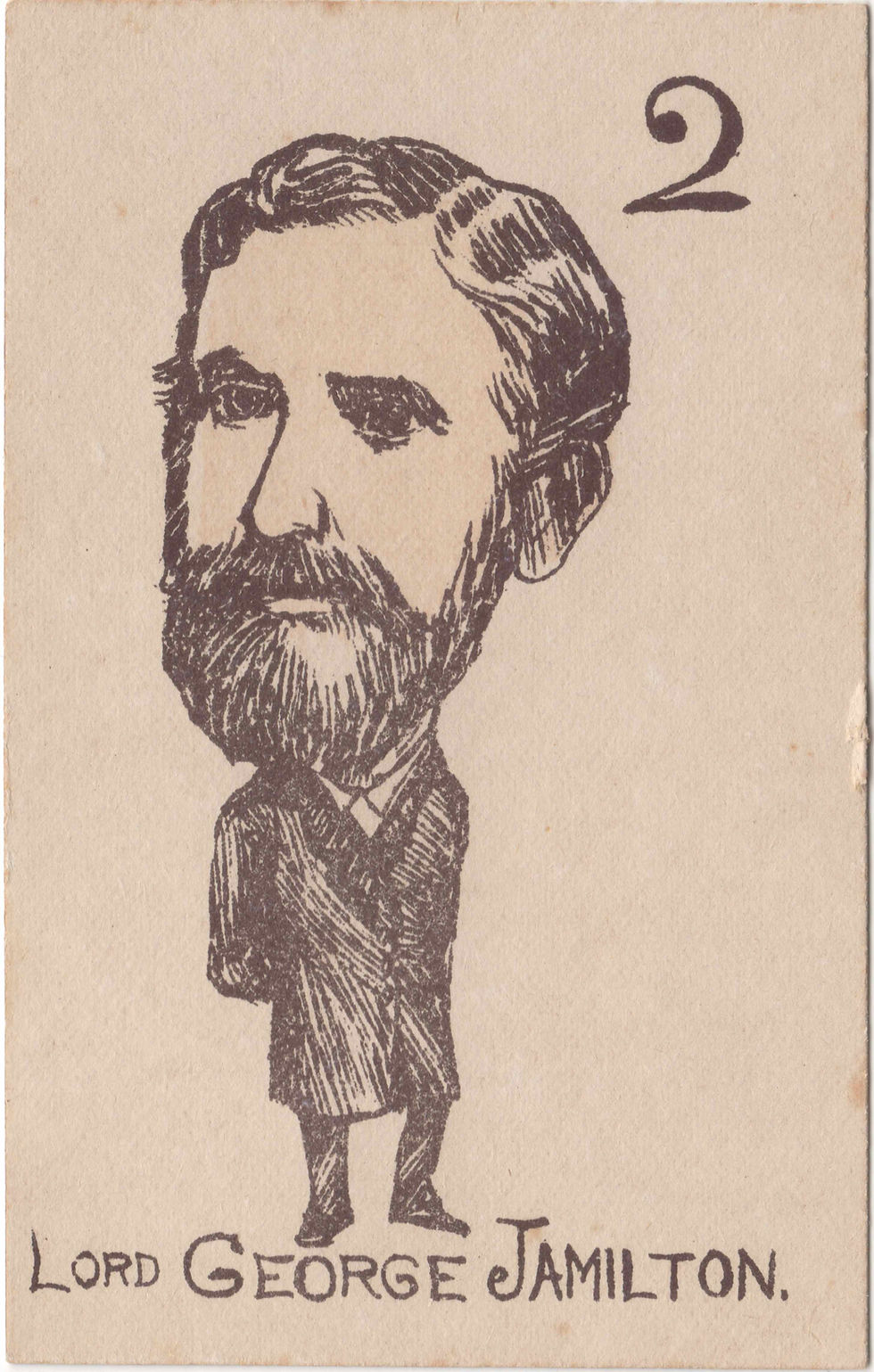 | 2 Lord George Jamilton Lord George Hamilton (1845-1927)
MP for Middlesex between 1868 and 1885 and for Ealing from 1885-1906. Under-Secretary of State for India from 1874-1878. First Lord of the Admiralty 1885 and 1886-1892.
|
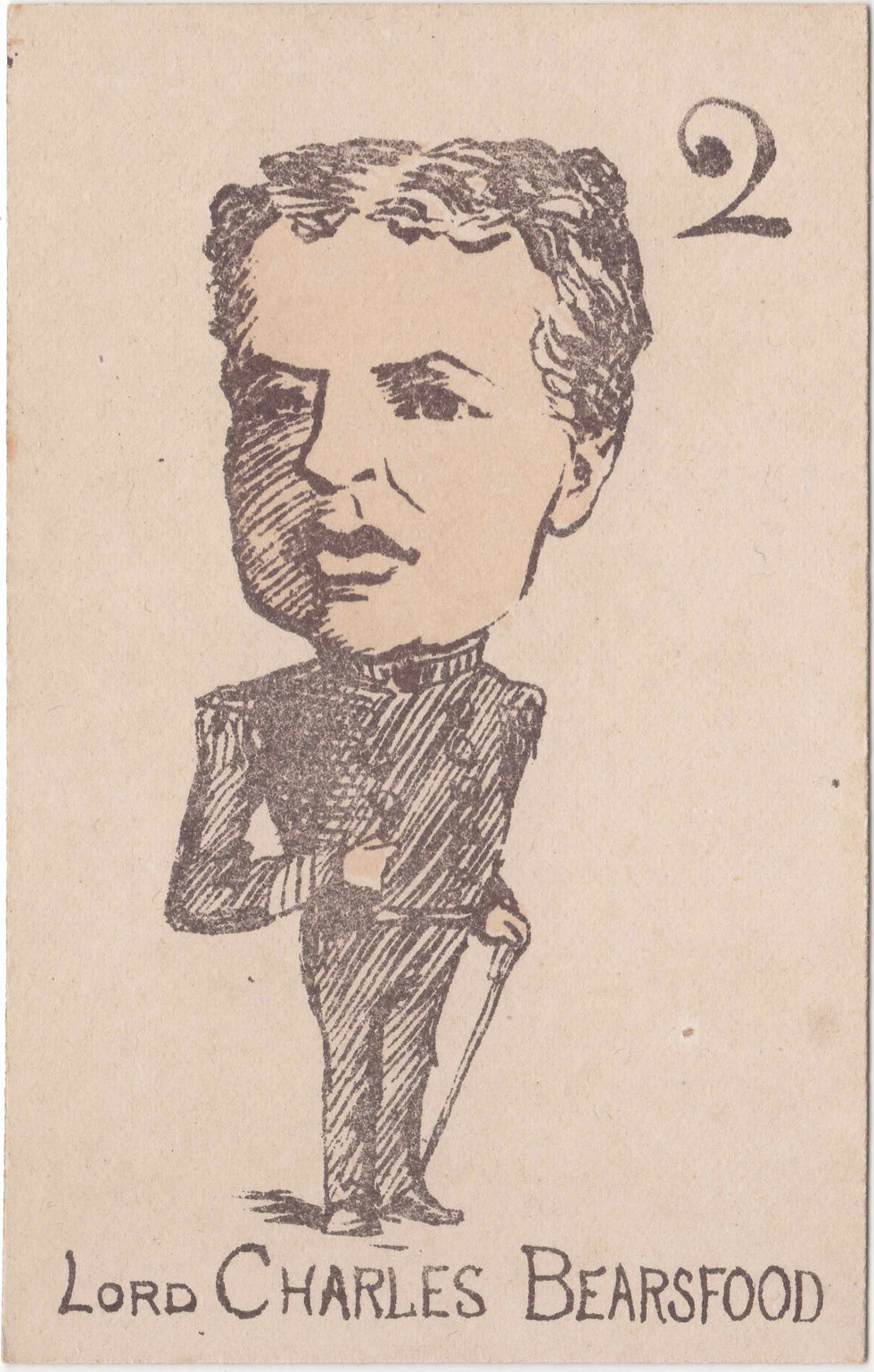 | 2 Lord Charles Bearsfood Lord Charles Beresford (1846-1919) British Admiral and an MP for various constituencies: Waterford 1874–1880, East Division of Marylebone 1885–89, York 1897–1900 & Woolwich 1902-1903. Nicknamed "Charlie B" in the press. Ennobled in 1916 as Baron Beresford of Metemmeh and Curraghmore, co. Waterford. he had been known as Lord Charles Beresford since 1859. |
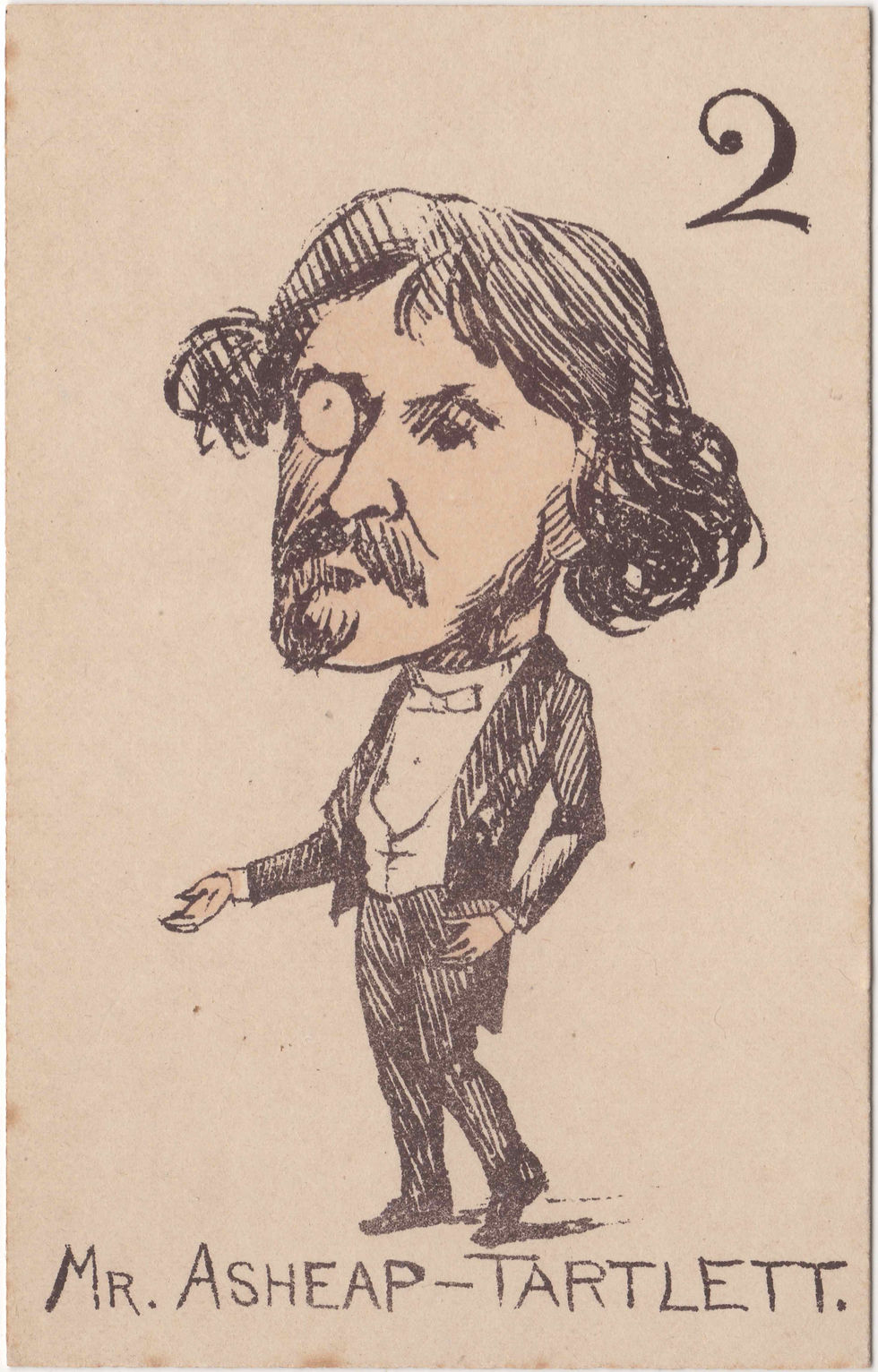 | 2 Mr Asheap-Tartlett Sir Ellis Ashmead-Bartlett (1849-1902) MP for Eye, Suffolk 1880-1885 and Sheffield Ecclesall 1885-1902. Civil Lord of the Admiralty from 1885-1892. Knighted in 1892. |
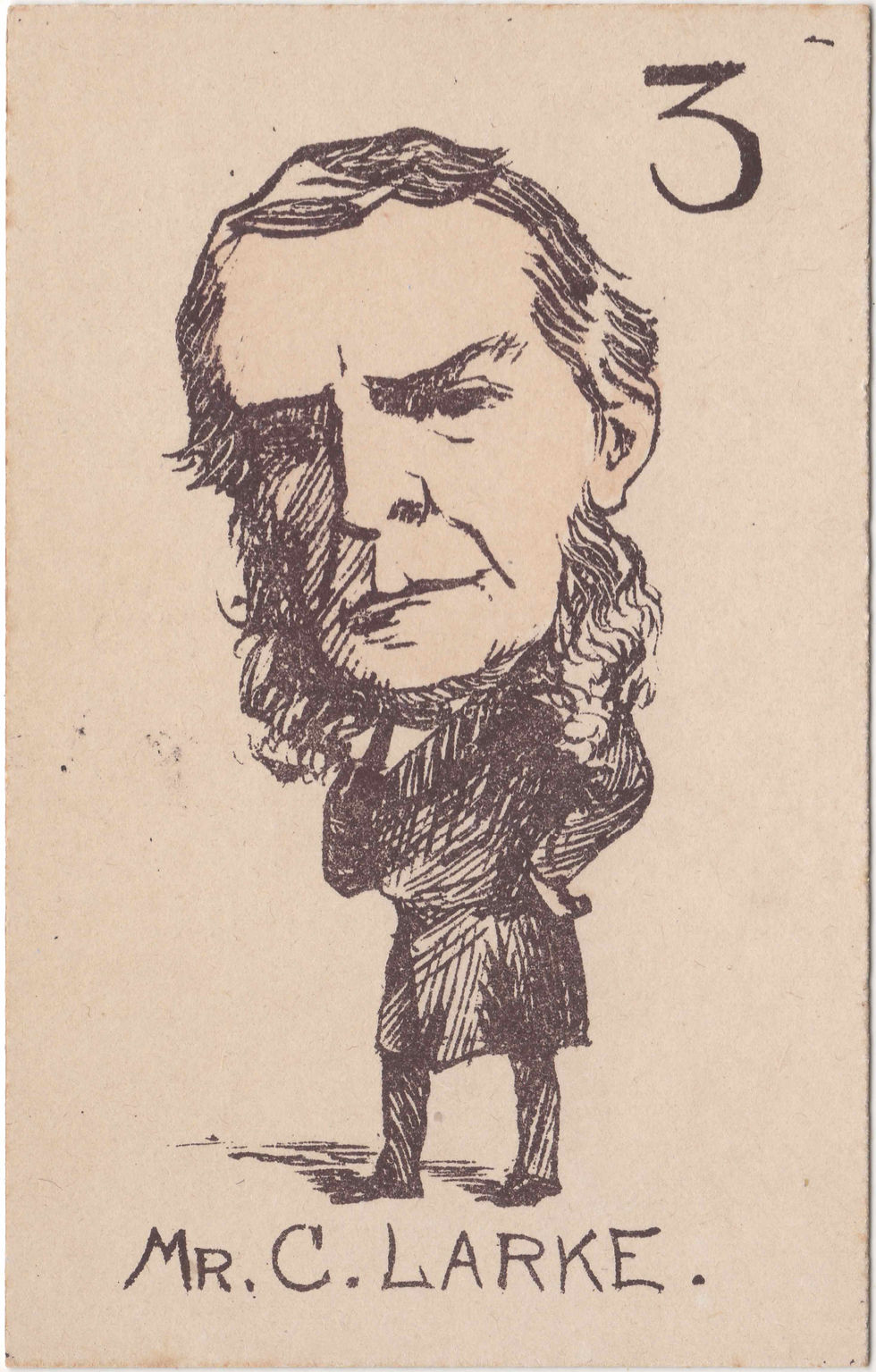 | 3 Mr C Larke Sir Edward George Clarke (1841-1931) Barrister and politician. Solicitor-General 1886–1892. Briefly MP for Southwark in 1880 and then MP for Plymouth 1880-1900. Served as an MP for The City of London in 1906 before resigning in the same year. His legal career included representing Oscar Wilde in his failed prosecution of the Marquess of Queensberry. |
 | 3 Lord Kytton Robert Bulwer-Lytton, 1st Earl of Lytton (1831-1891) Politician and poet who wrote under the pen name "Owen Meredith". Viceroy of India between 1876-1880, British Ambassador to France 1887-1891. In 1880 he was created Earl of Lytton and in 1881 Viscount Knebworth. |
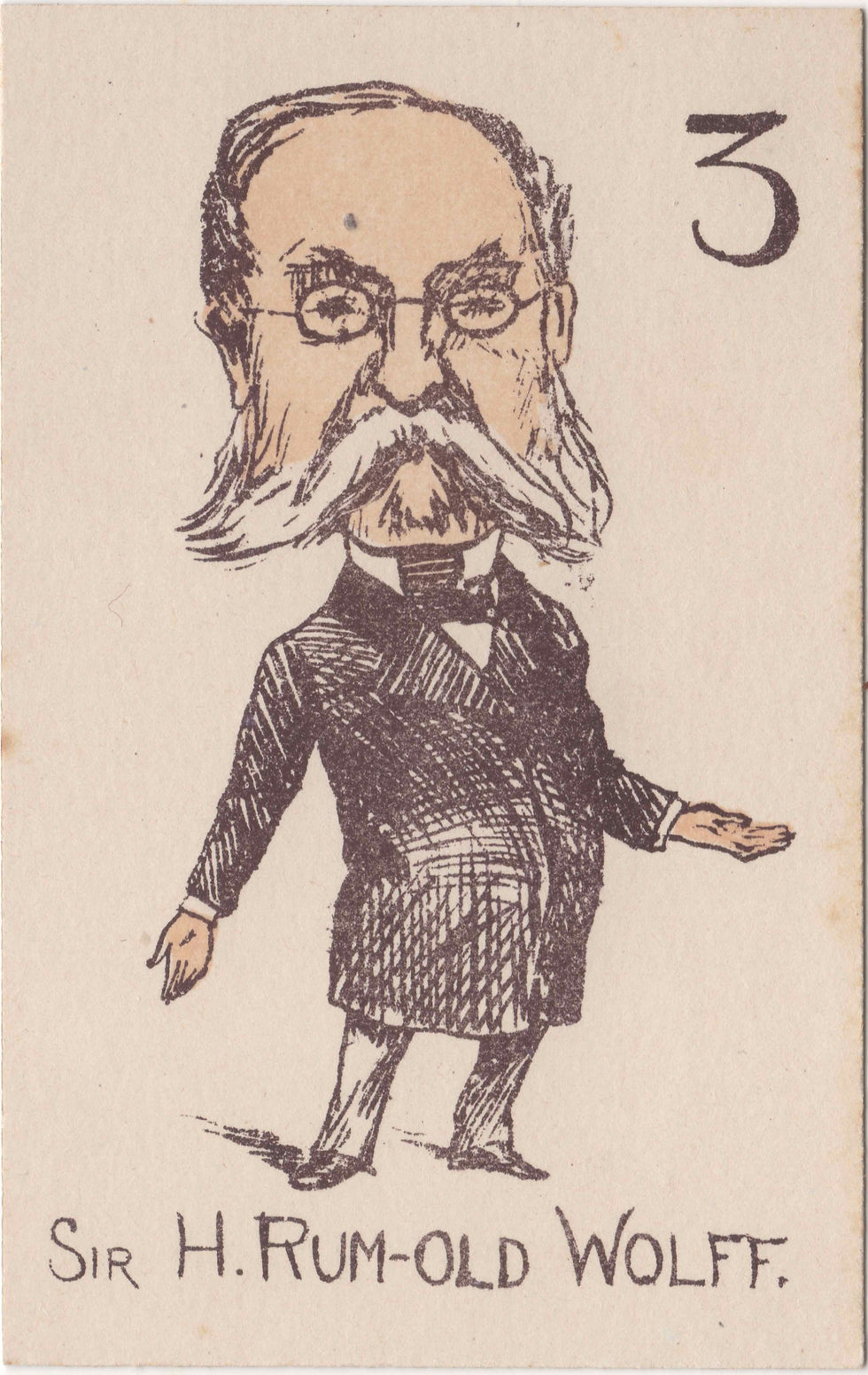 | 3 Sir H. Rum-Old Wolff (1830-1908) MP for Christchurch 1874-1880 and for Portsmouth from 1880-1885. An influential back bencher. Together with Winston Churchill and Sir Algernon Borthwick, Wolff launched the Primrose League, to promote Conservative principles throughout Britain, at meeting held in the Carlton Club in 1883. |
 | 4 Col. Manley (1816-1889) MP for Abingdon 1865-1874. He was Lieutenant-Colonel in the Grenadier Guards and Colonel in the St George's Rifle Regiment. |
 | 4 Rt. Hon. J. Shout-Louder (1840-1904) MP for three constituencies, York 1865-1880, North Lincolnshire 1881-1885 & Isle of Thanet 1888-1903. Appointed Under-Secretary of State for the Colonies in 1874. In 1878 appointed as Chief Secretary for Ireland. A breeder of racehorses and member of the Jockey Club from 1877. |
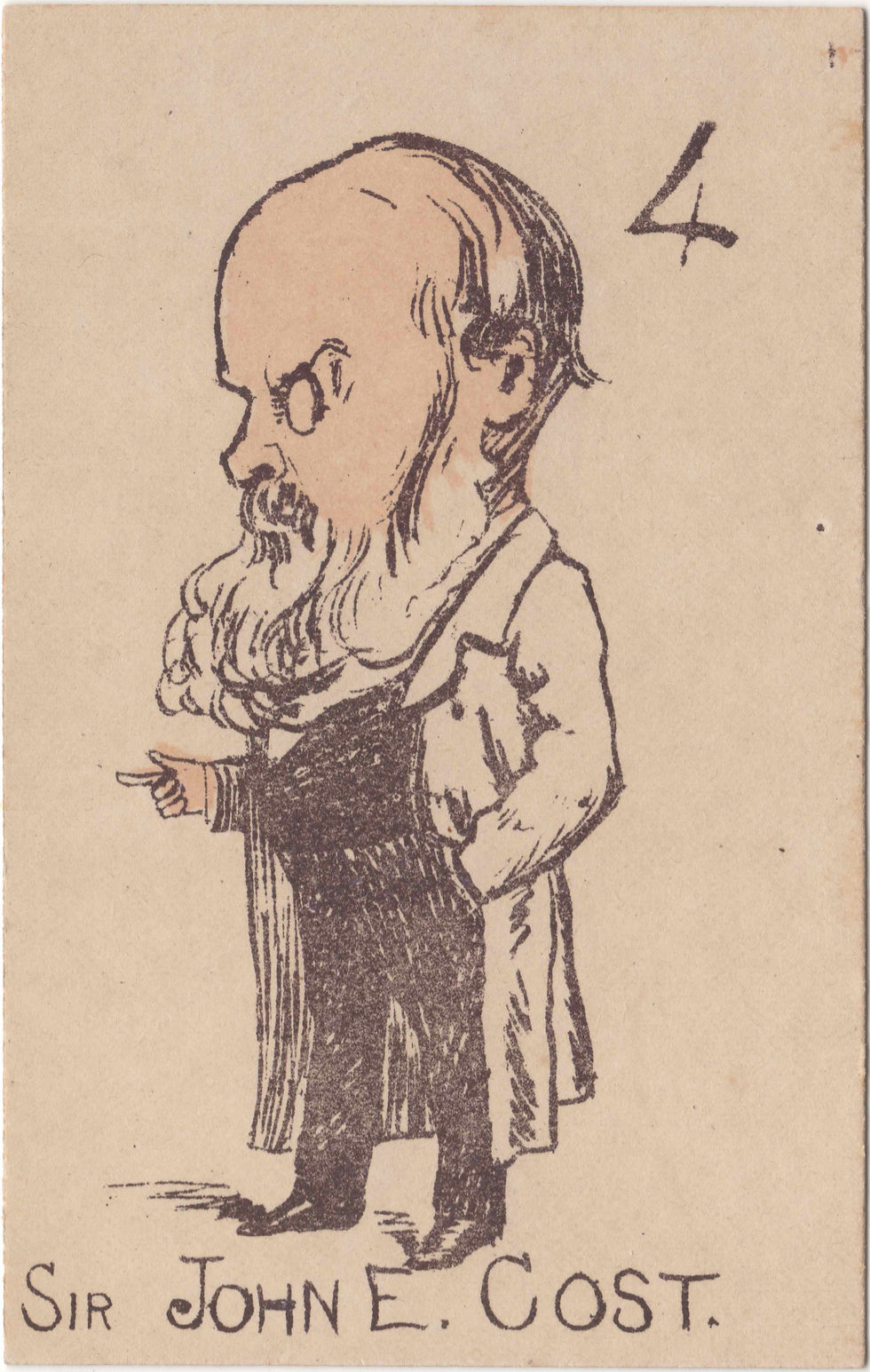 | 4 Sir John E. Cost (1835-1916) British barrister and politician. He served as Solicitor-General for England from 1885 to 1886 and as Vice-President of the Committee on Education between 1895 and 1902. MP for Cambridge 1866-1868, Chatham 1875-1892 and one of the two members for Cambridge University 1892-1906. |
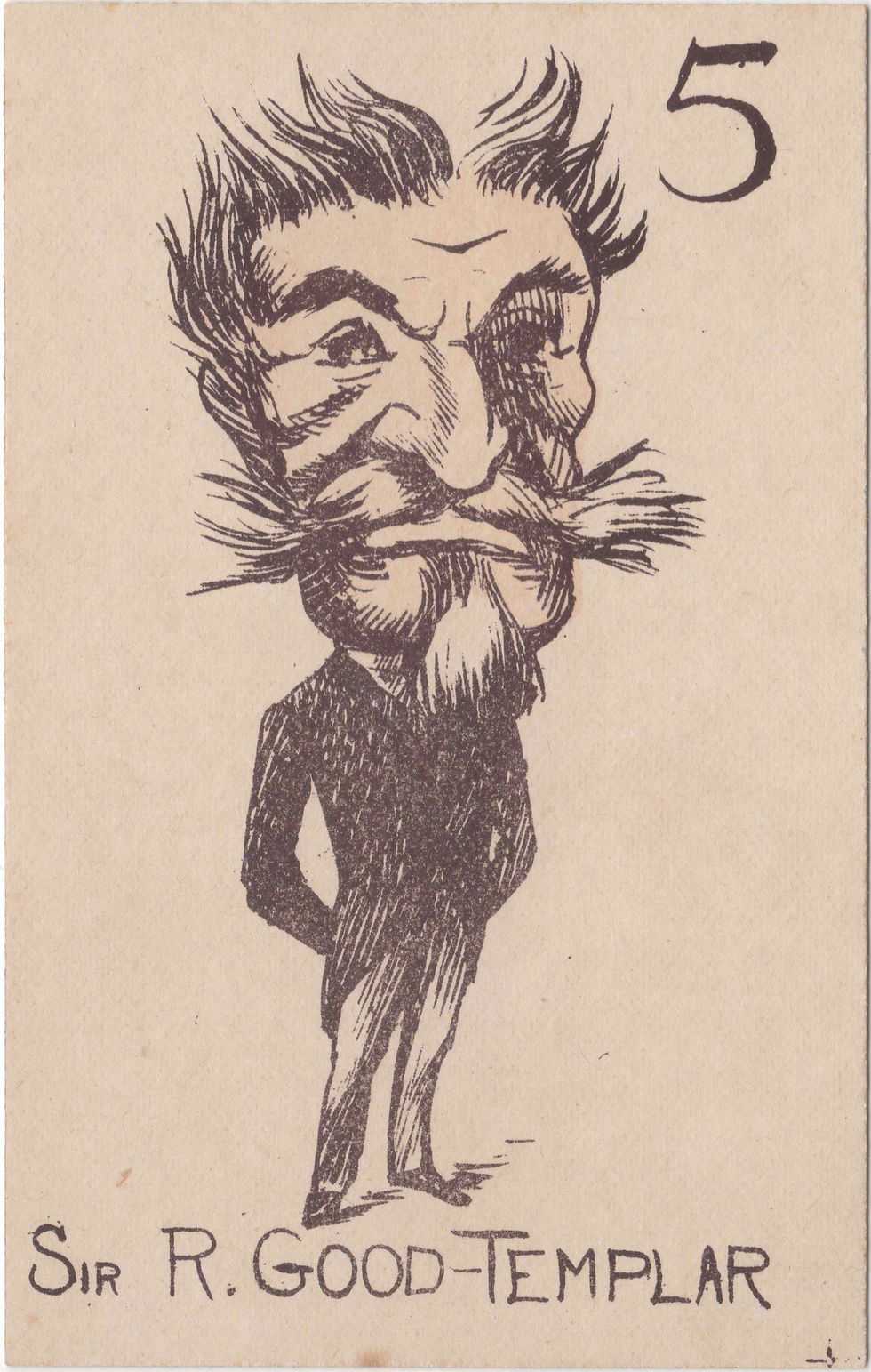 | 5 Sir R. Good-Templar (1826-1902) Colonial administrator in India for over 30 years, Governor of Bombay from 1877 to 1880. MP for Evesham 1885–1892 and Kingston upon Thames 1892–1895. A Privy Councillor from 1896. In his entry for the Dictionary of National Biography, David Steele describes Temple as "a loyal back-bencher and tireless committee man." but adds "Physically unprepossessing, Temple was a cartoonist's delight.". |
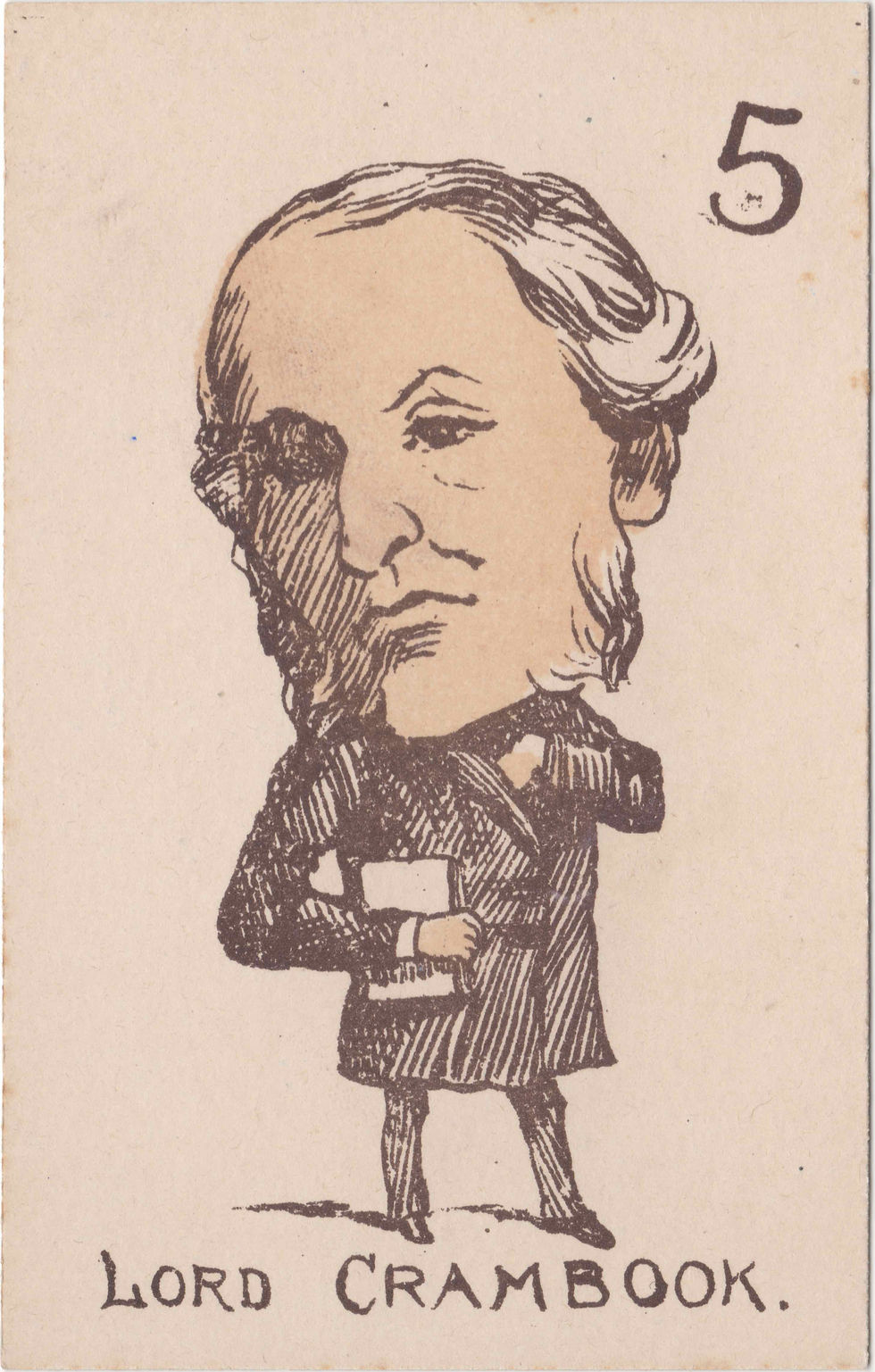 | 5 Lord Crambrook Gathorne Gathorne-Hardy, 1st Earl of Cranbrook (1814-1906) Gathorne-Hardy held a cabinet post in every Conservative government between 1858 and 1892. He was Home Secretary from 1867-1868, Secretary of State for War 1874-1878 and Lord President of the Council 1885-1886. In 1878, he was ennobled, entering the House of Lords as Viscount Cranbrook. |
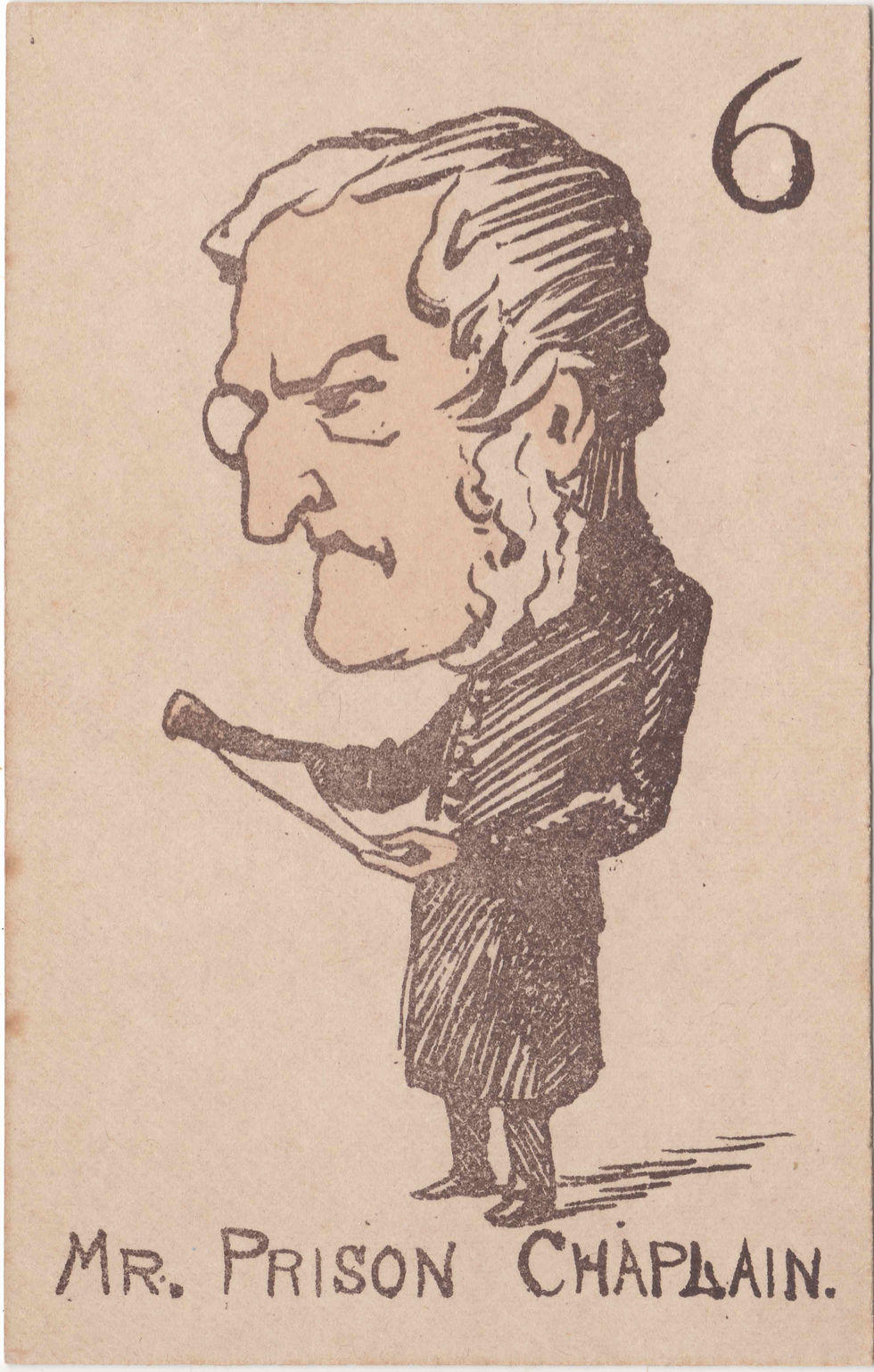 | 6 Mr Prison Chaplain (1840-1923) MP for Mid-Lincolnshire 1868-1885, Sleaford 1885-1906, Wimbledon 1907-1916, his defeated opponent in the 1907 Wimbledon by-election was Bertrand Russell. He became the first President of the Board of Agriculture in 1889. Ennobled as Viscount Chaplin in 1916. |
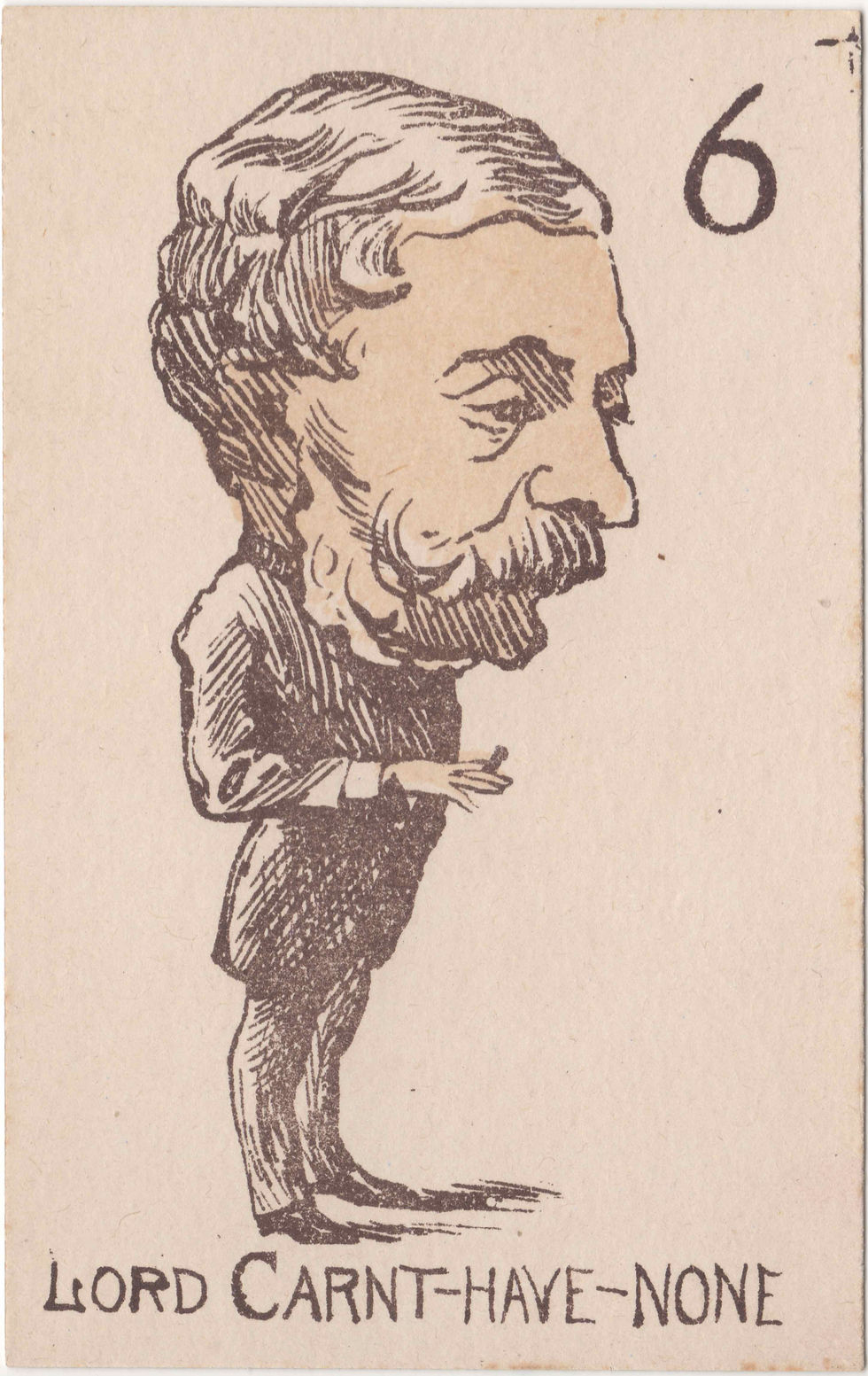 | 6 Lord Carnt-Have-None Henry Herbert, 4th Earl of Carnarvon (1831-1890) Known as Lord Porchester between 1833-1849. His gave his maiden speech in the House of Lords in 1854. In 1863 he worked on penal reform campaigning for the living conditions of prisoners to be made less comfortable with harder labour and more restricted diets. He was twice Secretary of State for the Colonies 1866-67 & 1874-78, he also served as Lord Lieutenant of Ireland 1885-1886. |
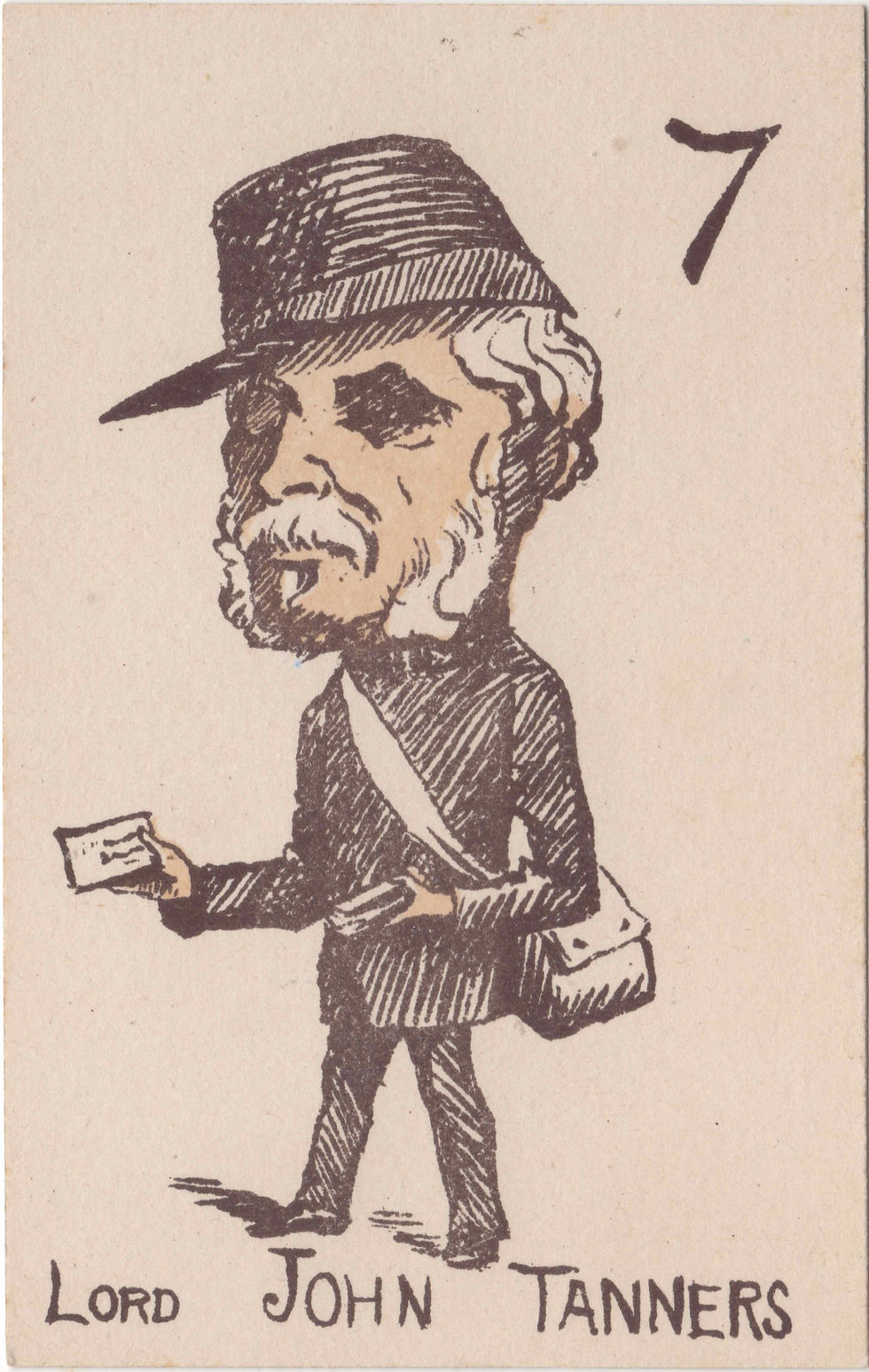 | 7 Lord John Tanners John James Robert Manners, 7th Duke of Rutland (1818-1906) MP for Newark 1841-1847, Colchester, 1850–57, North Leicestershire 1857–85 and Melton from 1885-1888. Known as Lord John Manners prior to 1888, after which succeeded his father as Duke of Rutland. Manners was Postmaster-General twice, 1874-1880 and 1885–86. During this second period he introduced sixpenny telegrams. |
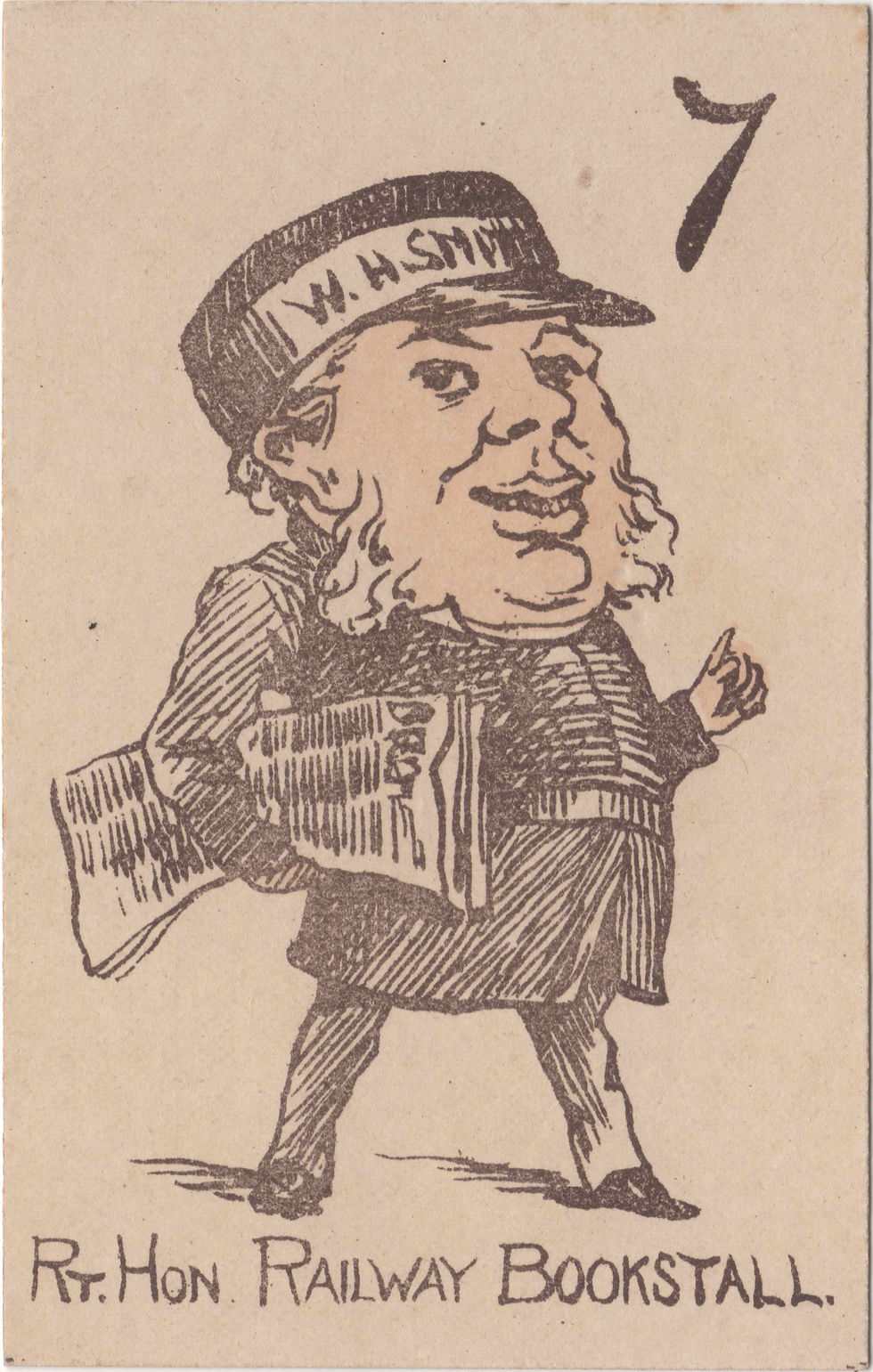 | 7 Rt. Hon. Railway Bookstall (1825-1891) William Henry Smith's father (also WIlliam Henry Smith) was a bookseller and newsagent. When Smith Junior joined his father's business in 1846 the company became W.H.Smith & Son. From 1848 the company began opening branches at railway stations, beginning at Euston and expanding nationwide. In 1874 Smith was appointed as Financial Secretary to the Treasury and in 1877, he became First Lord of the Admiralty. Smith never went to sea in his life and his appointment possibly inspired the character Sir Joseph Porter in Gilbert and Sullivan's H.M.S. Pinafore. |
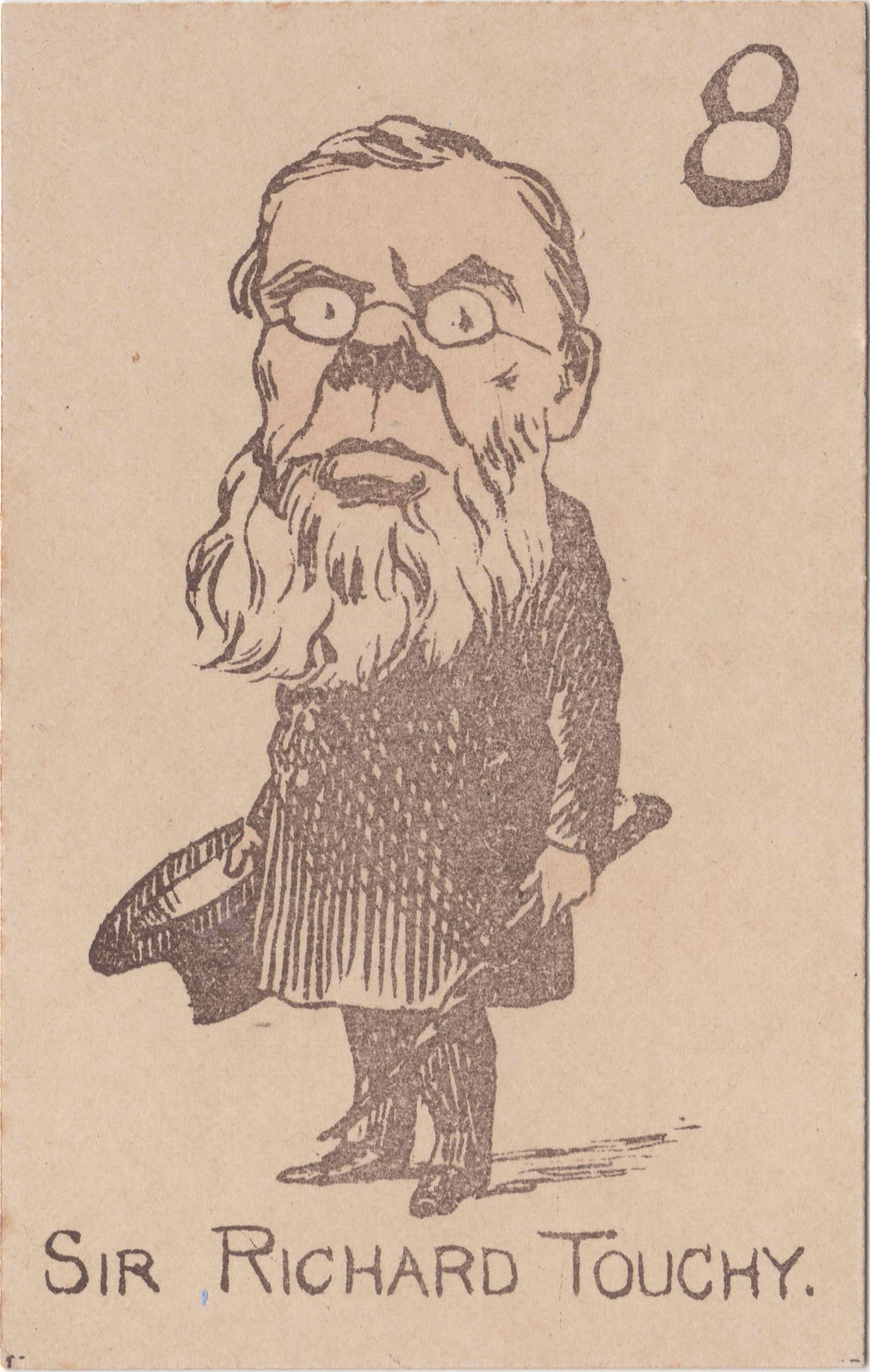 | 8 Sir Richard Touchy Richard Assheton Cross, 1st Viscount Cross (1823-1914) Served as one of Preston's two MPs 1857-1862 and as MP for South West Lancashire 1868-1886. Known, before his elevation to the peerage in 1886, as R. A. Cross. He was twice Home Secretary, from 1874-1880 and 1885-1886. |
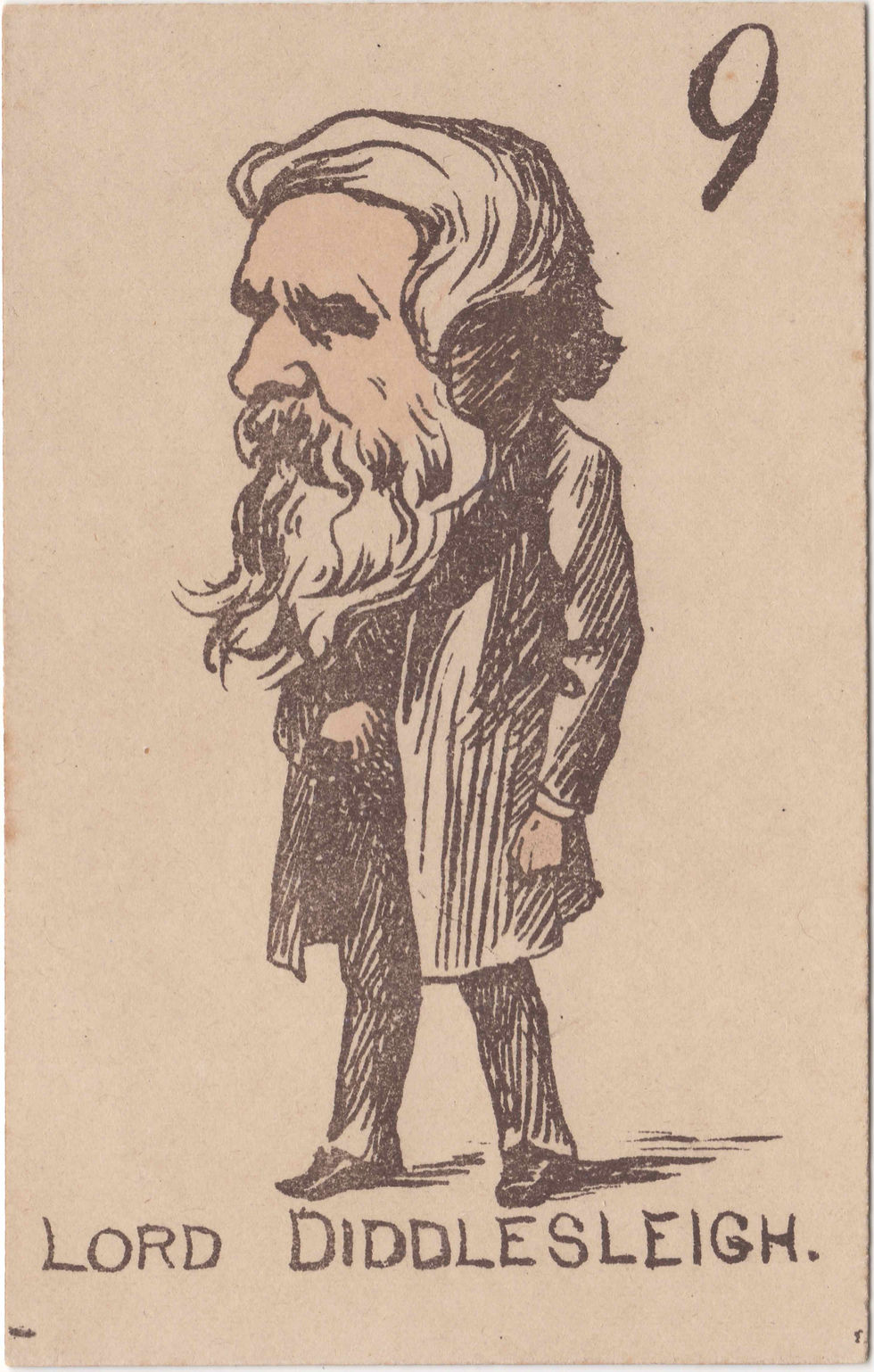 | 9 Lord Diddlesleigh Stafford Henry Northcote,1st Earl of Iddesleigh (1818-1887) MP for Dudley 1855-1857, Stamford 1858-1865 and North Devon 1866-1885. Northcote served as President of the Board of Trade 1866-67, Secretary of State for India 1867-68, Chancellor of the Exchequer 1874-1880 and as Foreign Secretary 1885-1886. He was also Governor of the Hudson's Bay Company, when it sold the Northwest Territories to Canada and was one of the commissioners for the settlement of the Alabama Claims with the United States, culminating with the Treaty of Washington in 1871. |
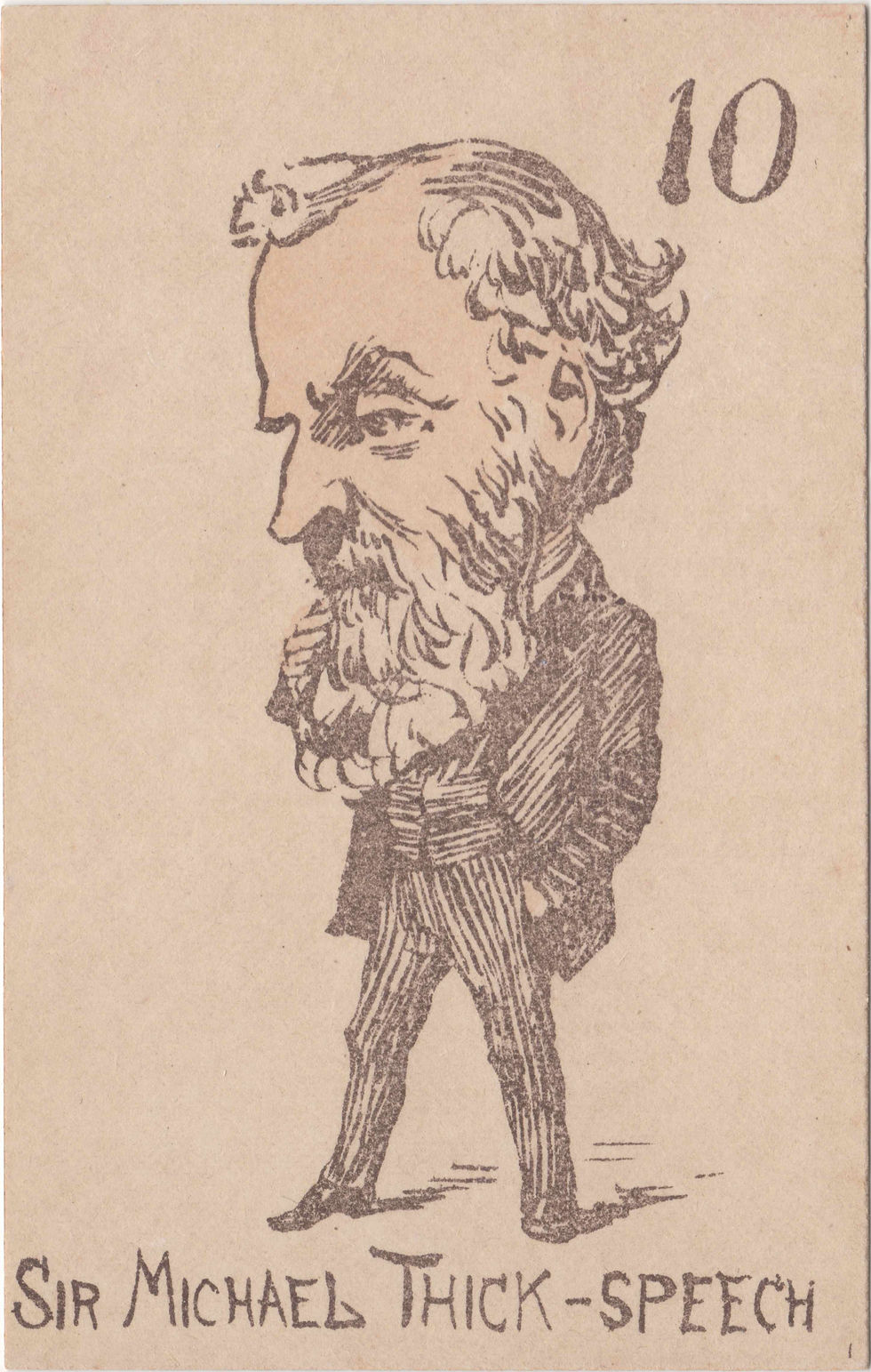 | 10 Sir Michael Thick-Speech Michael Edward Hicks Beach, 1st Earl St Aldwyn (1837-1916) Known as Sir Michael Hicks Beach, Bt, from 1854 until 1906 when he took his peerage. MP for East Gloucestershire 1864-1885 and for Bristol West 1885-1906. Served as Chancellor of the Exchequer from 1885-1886 and again from 1895-1902. Led the Conservative Party in the House of Commons from 1885-1886 and was Father of the House from 1901-1906. |
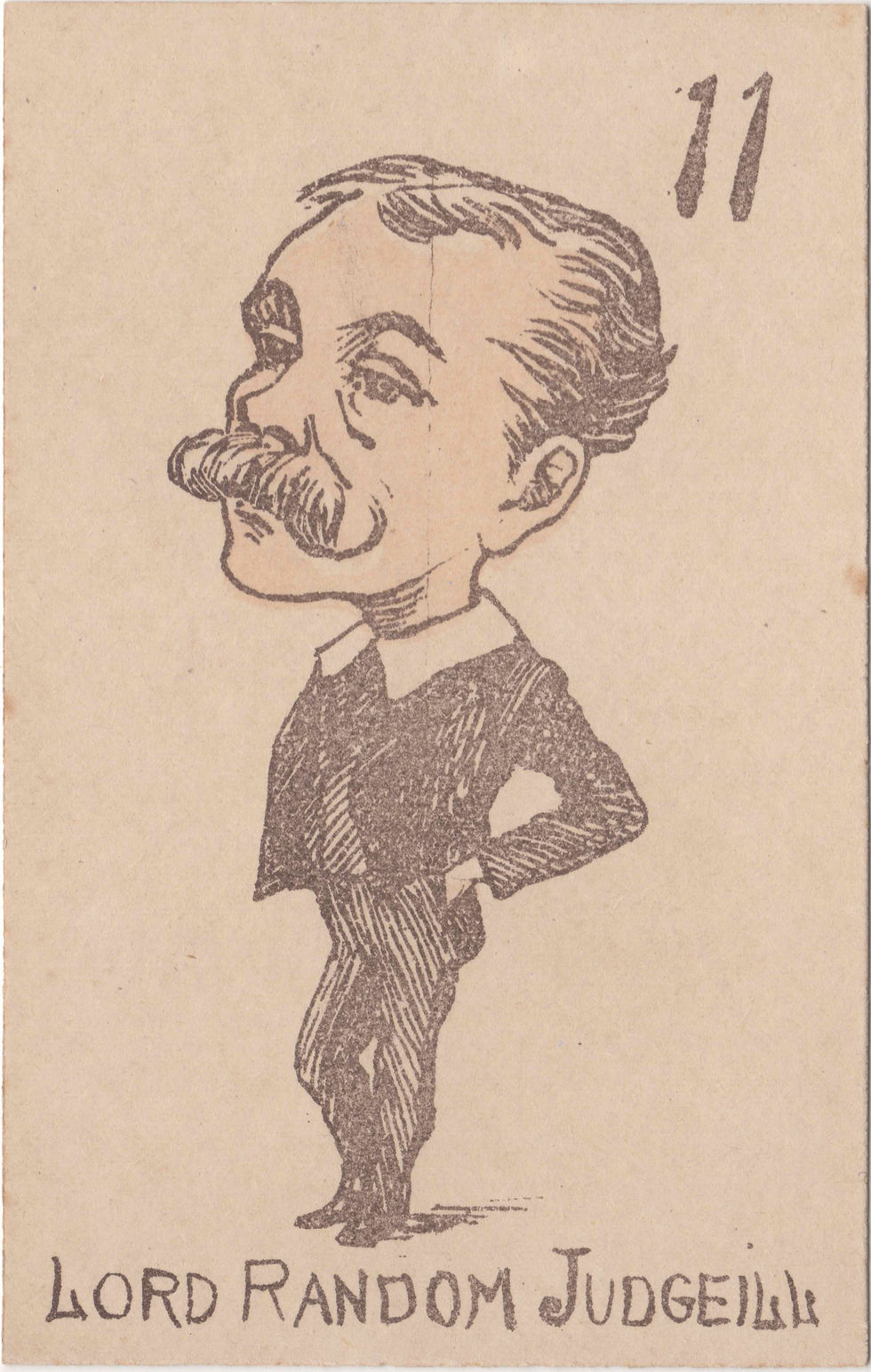 | 11 Lord Random Judge-ill Lord Randolph Henry Spencer-Churchill (1849-1895) Randolph Churchill's mental and physical health declined seriously throughout the 1890s and there has been much speculation since over the cause. He died on the 25th January 1895 at the age of 45. His son Winston Churchill died on the same date in 1965 at the age of 90. |
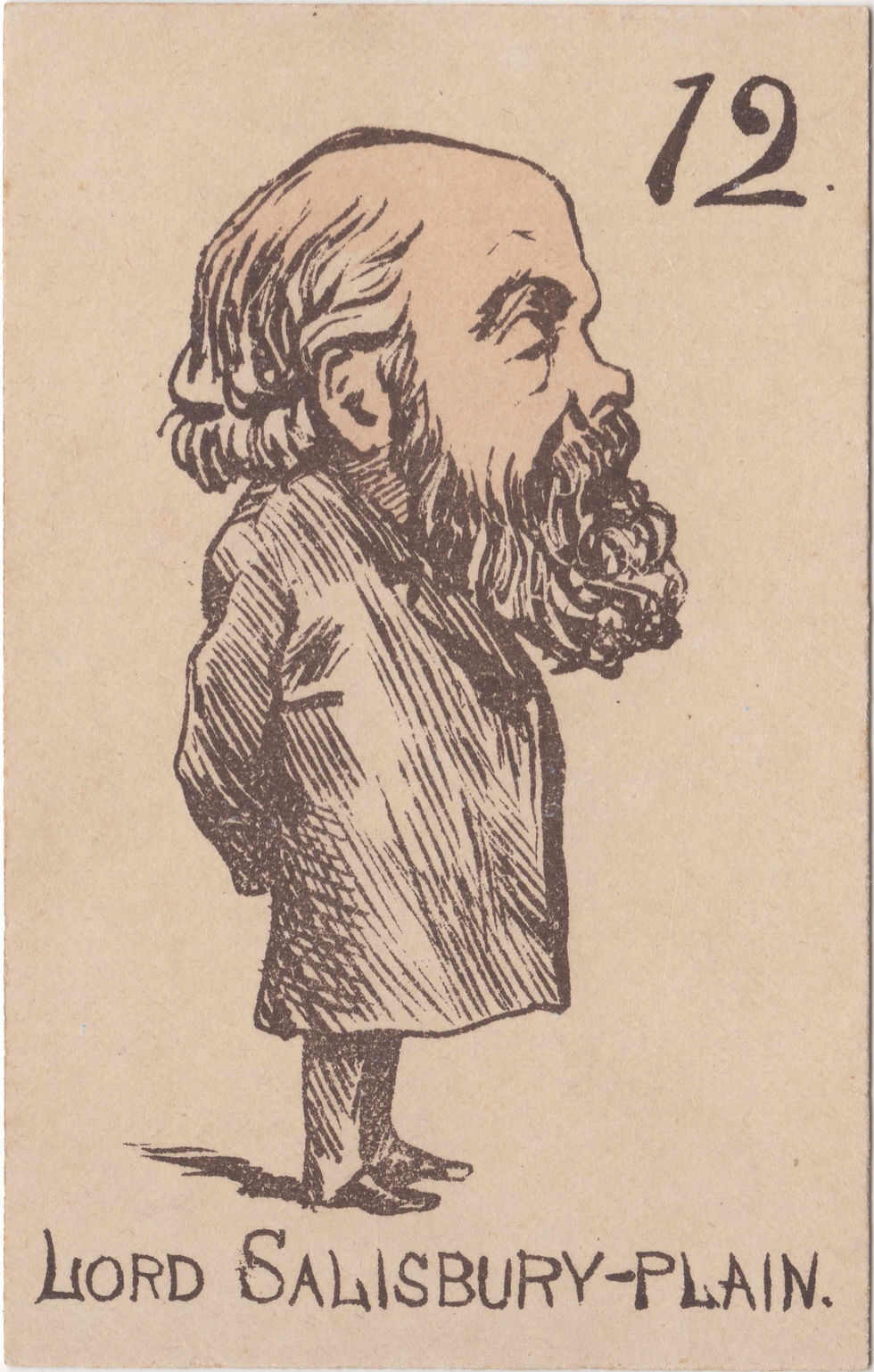 | 12 Lord Salisbury-Plain Robert Gascoyne-Cecil, 3rd Marquess of Salisbury Salisbury served as Prime Minister three times for a total of over thirteen years. He was also Foreign Secretary before and during most of his tenure. Salisbury had a cognitive disorder, prosopagnosia, which made it difficult for him to recognise familiar faces.
|
Liberals
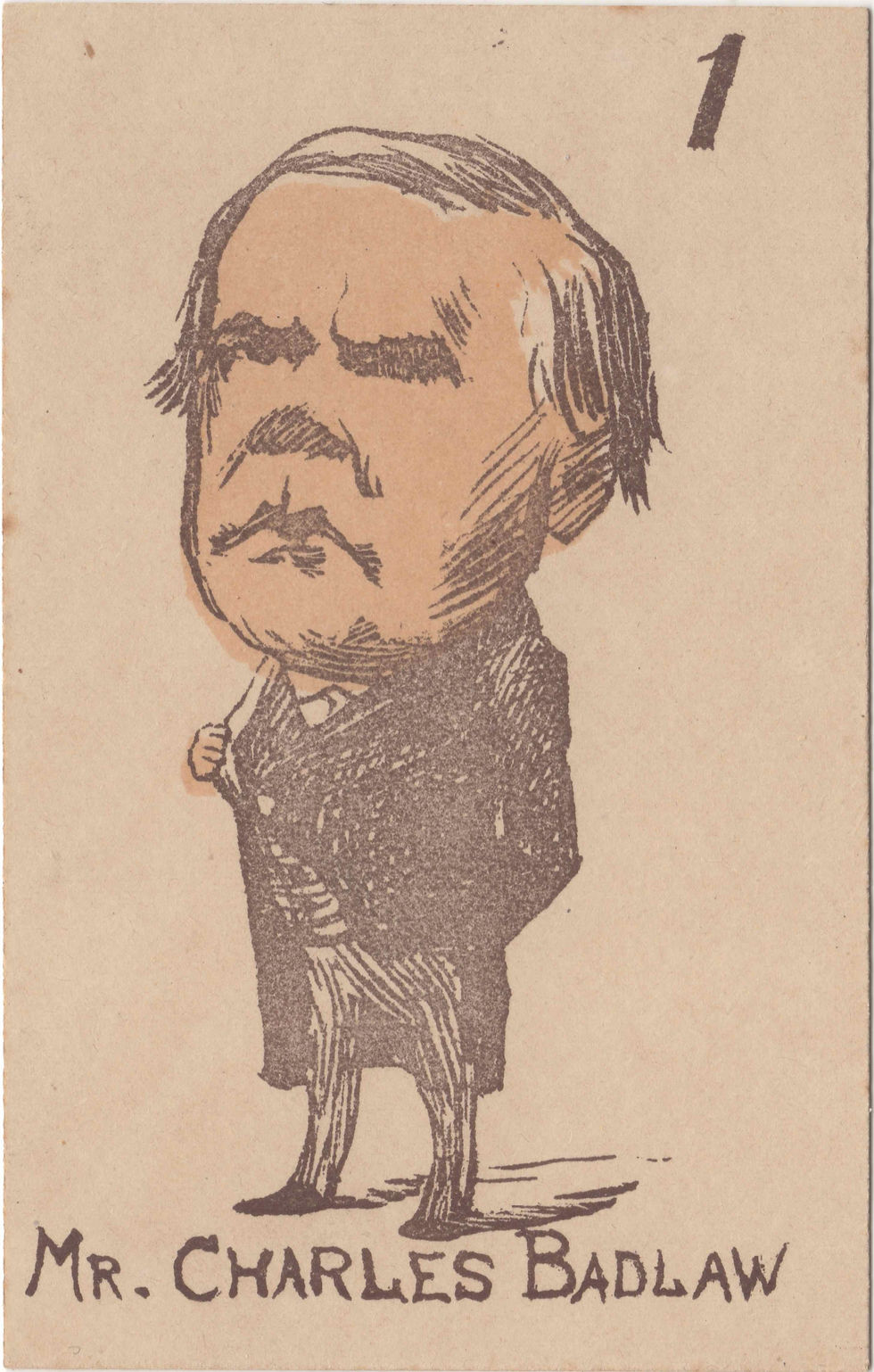 | 1 Mr Charles Badlaw (1833-1891) In 1880, Bradlaugh was elected as the MP for Northampton. As an atheist he refused to take the required Oath of Alleigance and so was unable to take his seat or vote legally. After two Select Committees had deliberated, Bradlaugh was briefly imprisoned in the Clock Tower of the Houses of Parliament and fined for voting illegally. After winning four successive by-elections he was eventually permitted to make an affirmation in place of the Oath in 1886. In 1888 he secured an Act permitting all Members of both Houses of Parliament the right to choose to make an affirmation. |
 | 1 Mr Party Knell (1851-1911) Leader of the Irish party in the House of Commons. Following the 1885 General Election, Parnell held the balance of power in Parliament, controlling 86 seats. Gladstone's conversion to Home Rule convinced Parnell to support the Liberals making possible Gladstone's third premiership. |
 | 2 Mr Labby Truth (1831-1912) Labouchère was elected at the 1865 general election as a MP for Windsor but the result was overturned. In 1867 he won a by-election as a MP for Middlesex but lost the seat in 1868. He served as one of Northampton's two MPs between 1880-1906. In 1880 the other MP for Northampton was Charles Bradlaugh, this prompted Labouchère to refer to himself as the Christian Member for Northampton. Labouchère was also a journalist and launched a magazine Truth in 1876. The magazine was often sued for libel and its publication was suspended during 1885 only returning the following year. |
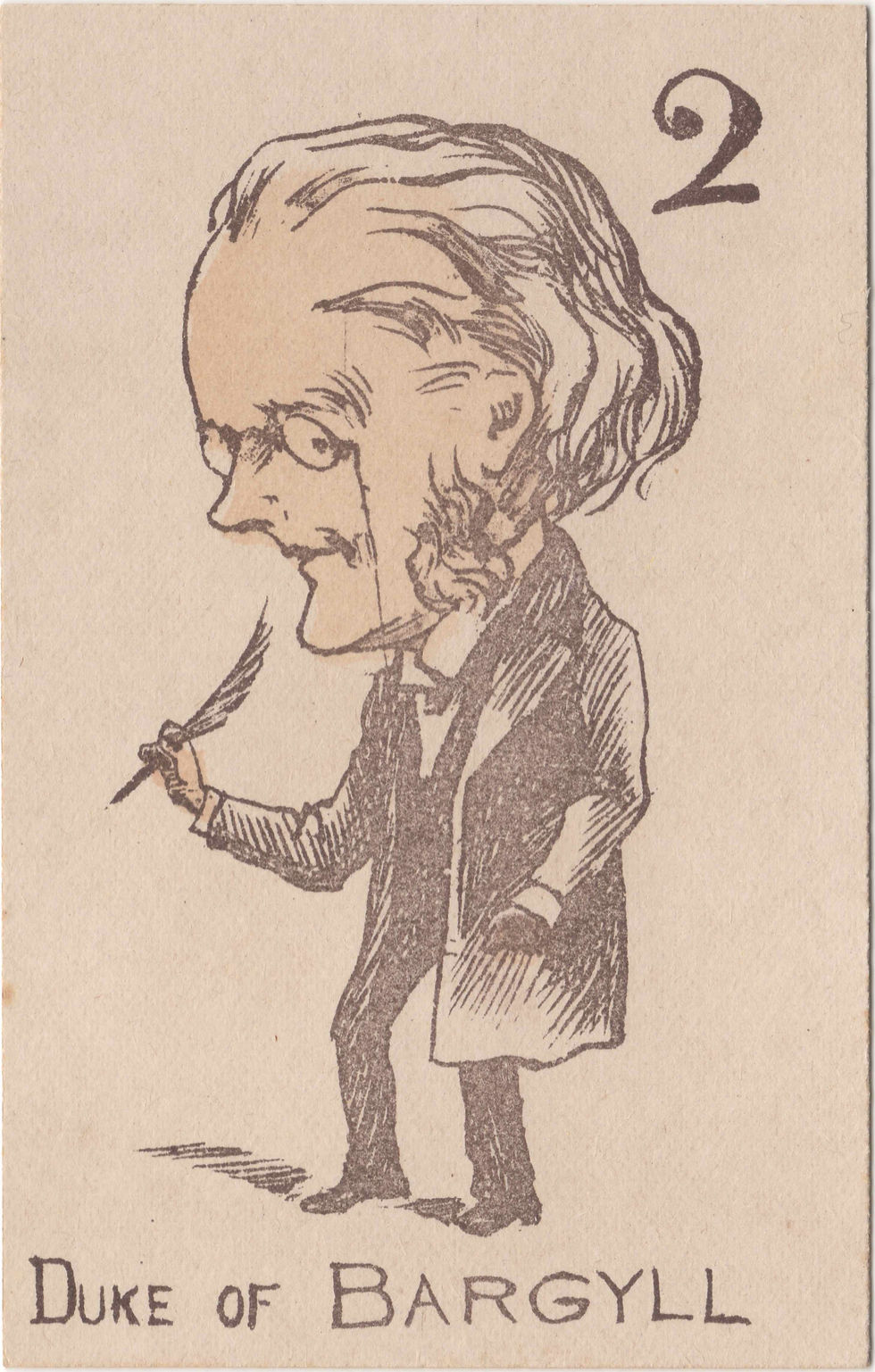 | 2 Duke of Bargyll George Douglas Campbell, 8th Duke of Argyll (1823-1900) Argyll held various government posts, including Privy Seal four times and Secretary of State of India from 1868-1874. He was keenly interested in education and scientific pursuits and was elected as a Fellow of the Royal Society but he opposed the theory of evolution. |
 | 2 Lord Chimberley John Wodehouse, 1st Earl of Kimberley (1826-1902) Known as the Lord Wodehouse from 1846 until 1866 when he became an Earl. Served as Secretary of State for the Colonies 1868-1870, Secretary of State for India 1882–1885, 1886 & 1892–1894 and as Foreign Secretary 1894-1895. "As leader of the Liberal party in the House of Lords he acted with undeviating dignity, and in opposition, he was a courteous antagonist and a critic of weight and experience" |
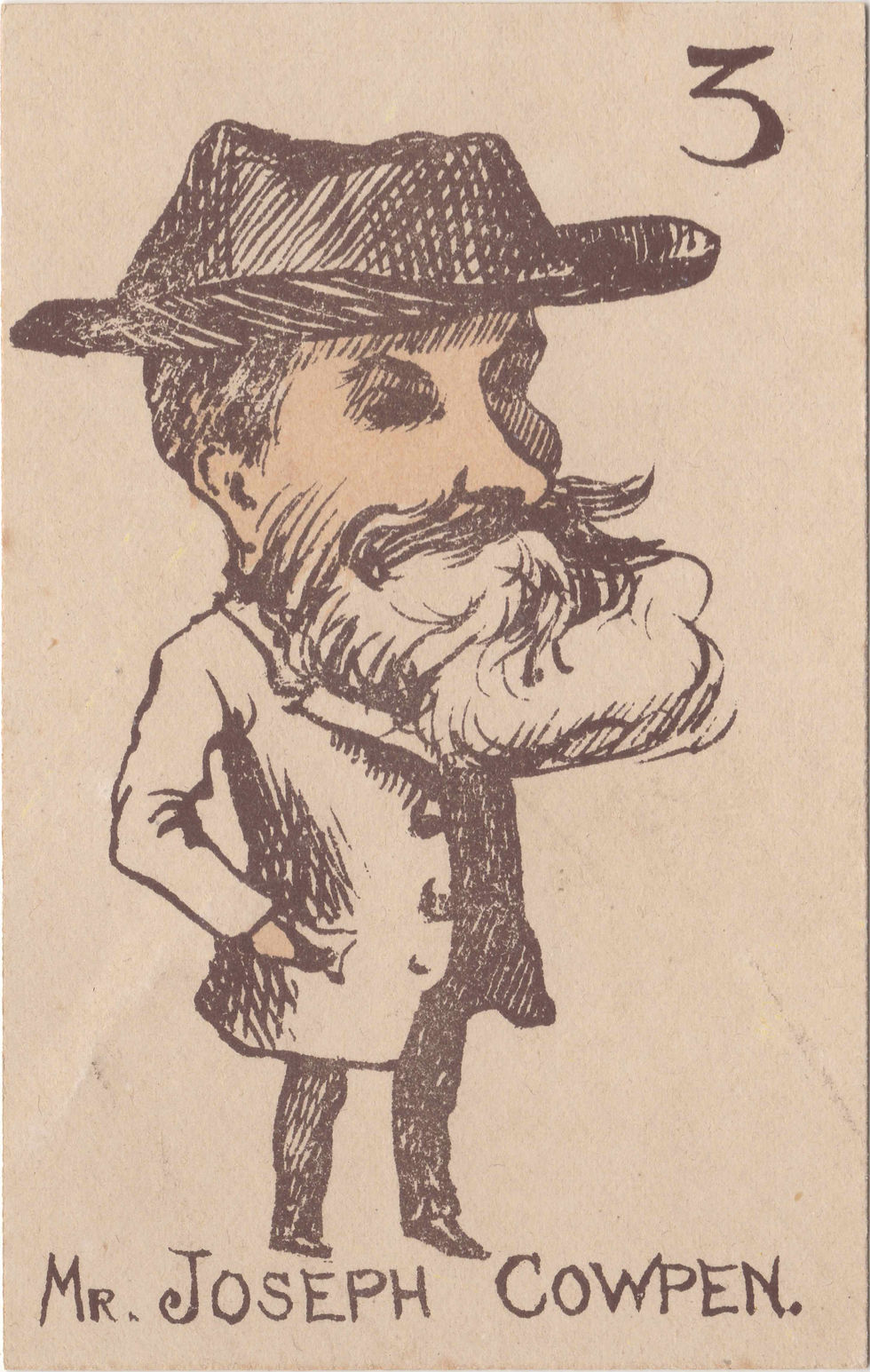 | 3 Mr Joseph Cowpen (1829-1900) From 1874 to 1885 he was MP for Newcastle. "In speech, dress and manner he identified with the coal miners of North East England". In 1886 he retired from Parliament disillusioned with the intrigues of party politics. |
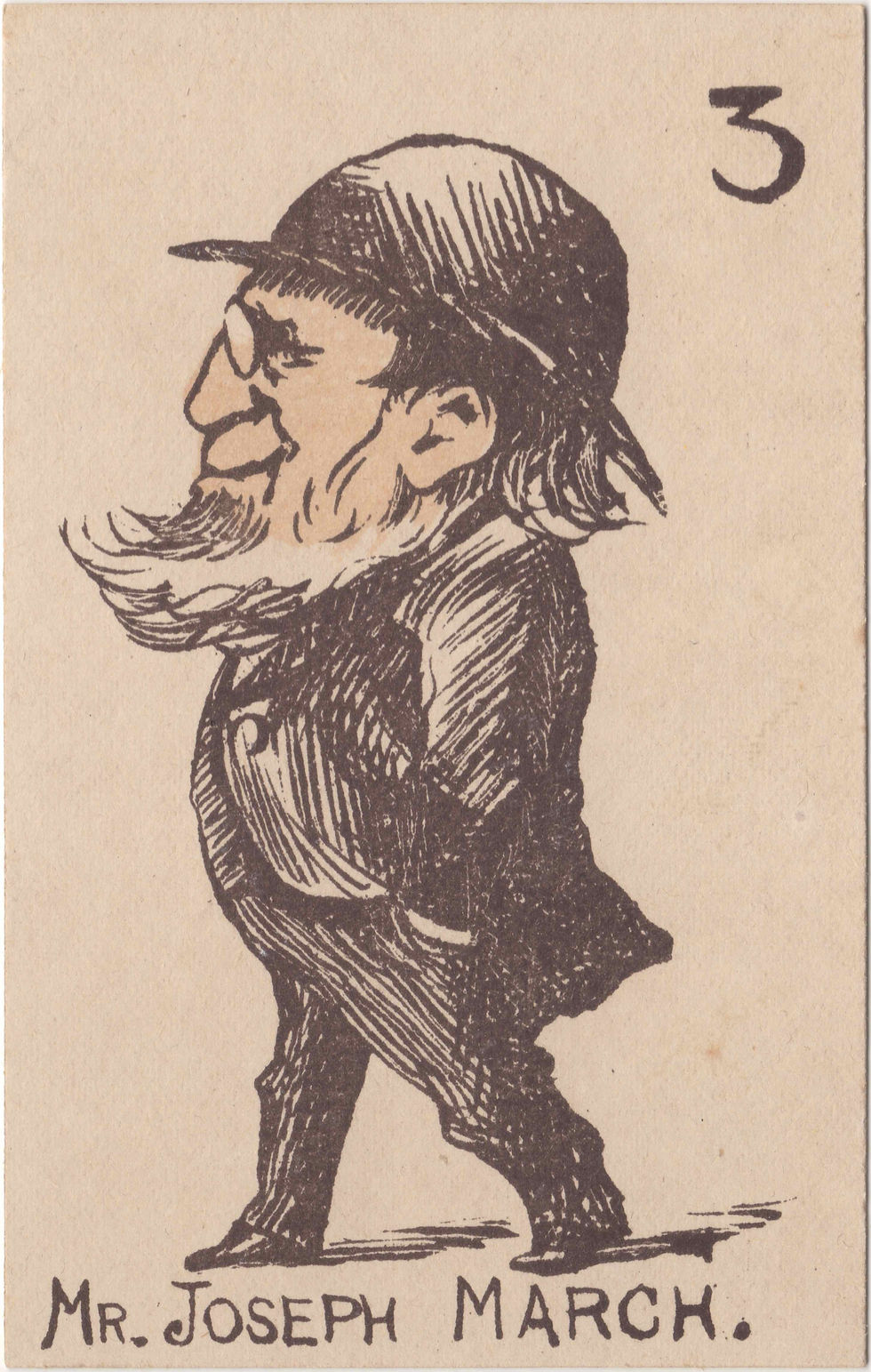 | 3 Mr Joseph March (1826-1919) Arch was a trade unionist who lobbied for the extension of the franchise. He helped form the National Agricultural Labourers' Union and became its first President in 1872. In1884 the franchise was extended by the Representation of the People Act and Arch became MP North West Norfolk, only to lose his seat a year later in 1886. Arch won the seat back in 1892 and served as its MP until 1900. |
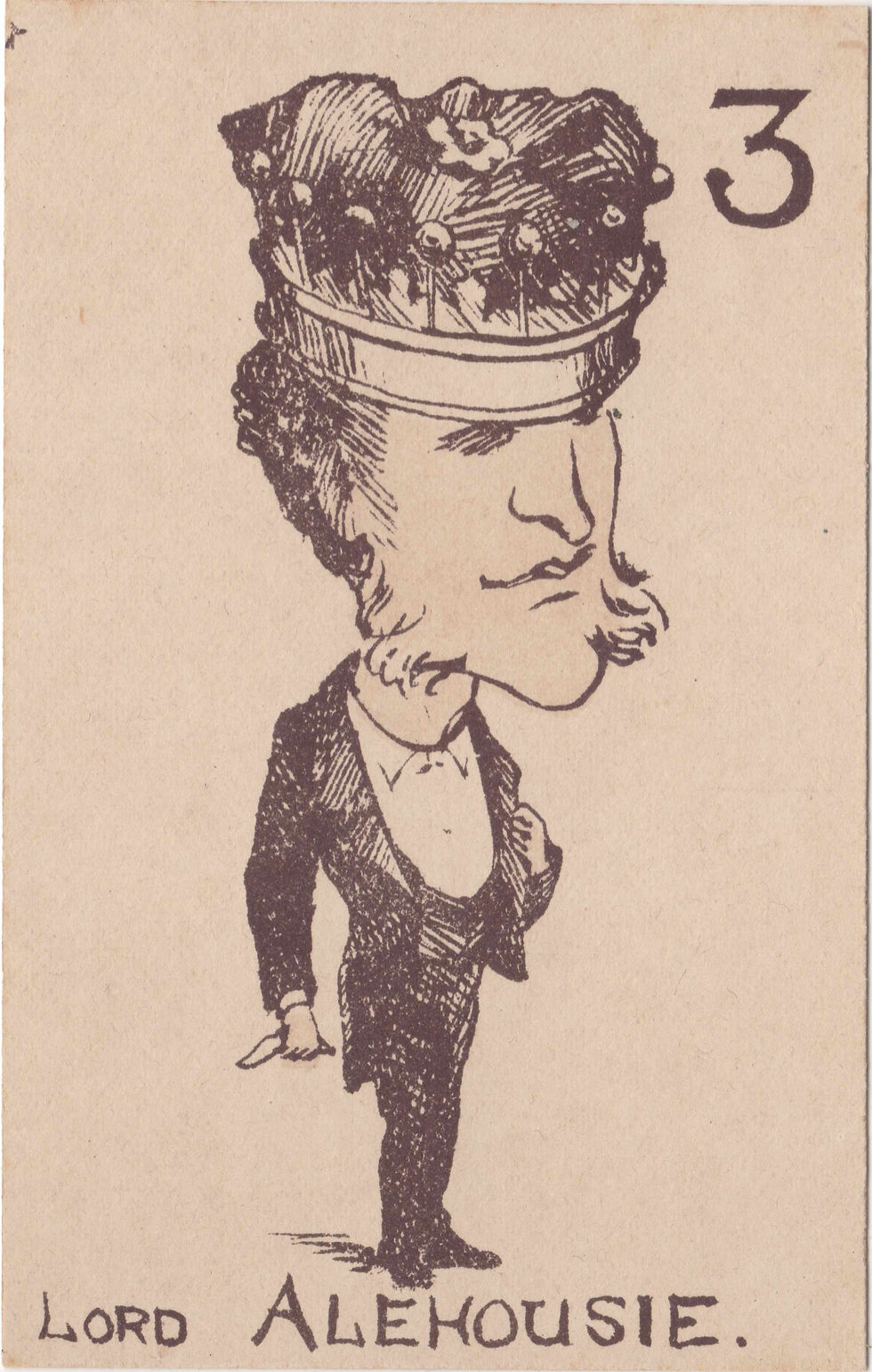 | 3 Lord Alehousie John William Maule Ramsay 13th Earl of Dalhousie (1847-1887) MP for Liverpool for four months in 1880 before entering the House of Lords upon the death of his father. Briefly Secretary for Scotland in 1886. In 1887 Dalhousie's wife died suddenly on the 24th of November, the following morning Dalhousie himself was found dead, presumably from shock. |
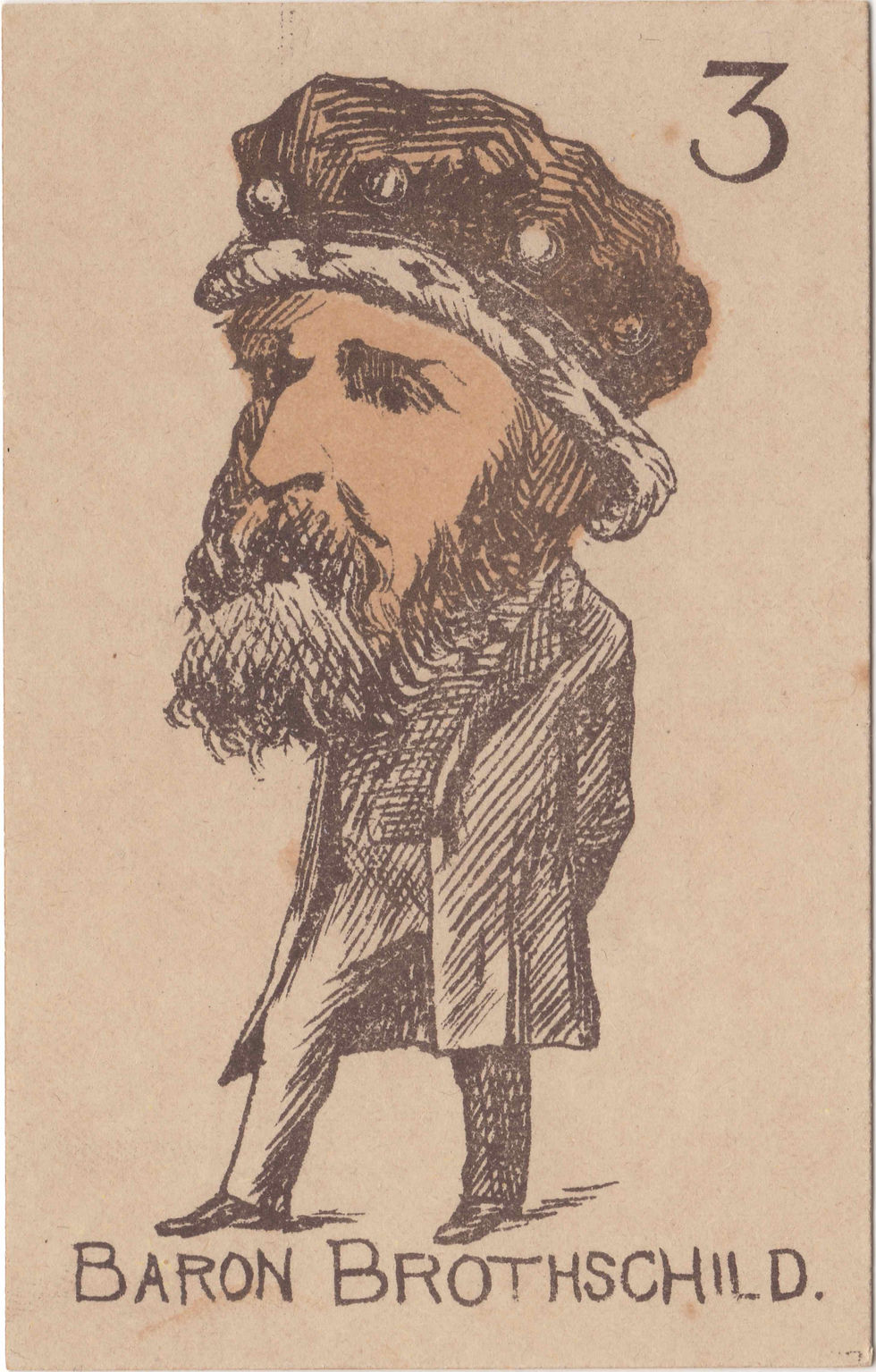 | 3 Baron Brothschild Ferdinand de Rothschild, Baron de Rothschild (1839-1898) MP for Aylesbury 1885-1898. A member of the Rothschild family of bankers and keen art collector. His Parliamentary career was undistinguished. From 1896, he was a Trustee of the British Museum, his Renaissance collection was bequeathed to the museum and is known today as the Waddesdon Bequest. |
 | 3 Lord Darby-Day Edward Henry Stanley, 15th Earl of Derby (1826-1893) The son of 14th Earl of Derby, a three time Prime Minister. Known as Lord Stanley from 1851 until 1869 when he succeeded his father. MP for King's Lynn 1848-1869. Became the first Secretary of State for India in 1858. In 1866 he was appointed Secretary of State for Foreign Affairs in his father's administration and was Foreign Secretary 1874-78. |
 | 4 Rt Hon. A.J. Umbrella (1825-1897) MP for Sheffield, later Sheffield Brightside, 1868-1897. Serving as Vice-President of the Committee of the Council of Education 1880-1885, Mundella secured compulsory schooling for all children and other reforms. President of the Board of Trade 1885-1886 and 1892-1894, he introduced reforms to the regulation of minimum wages, working hours and the employment of children. |
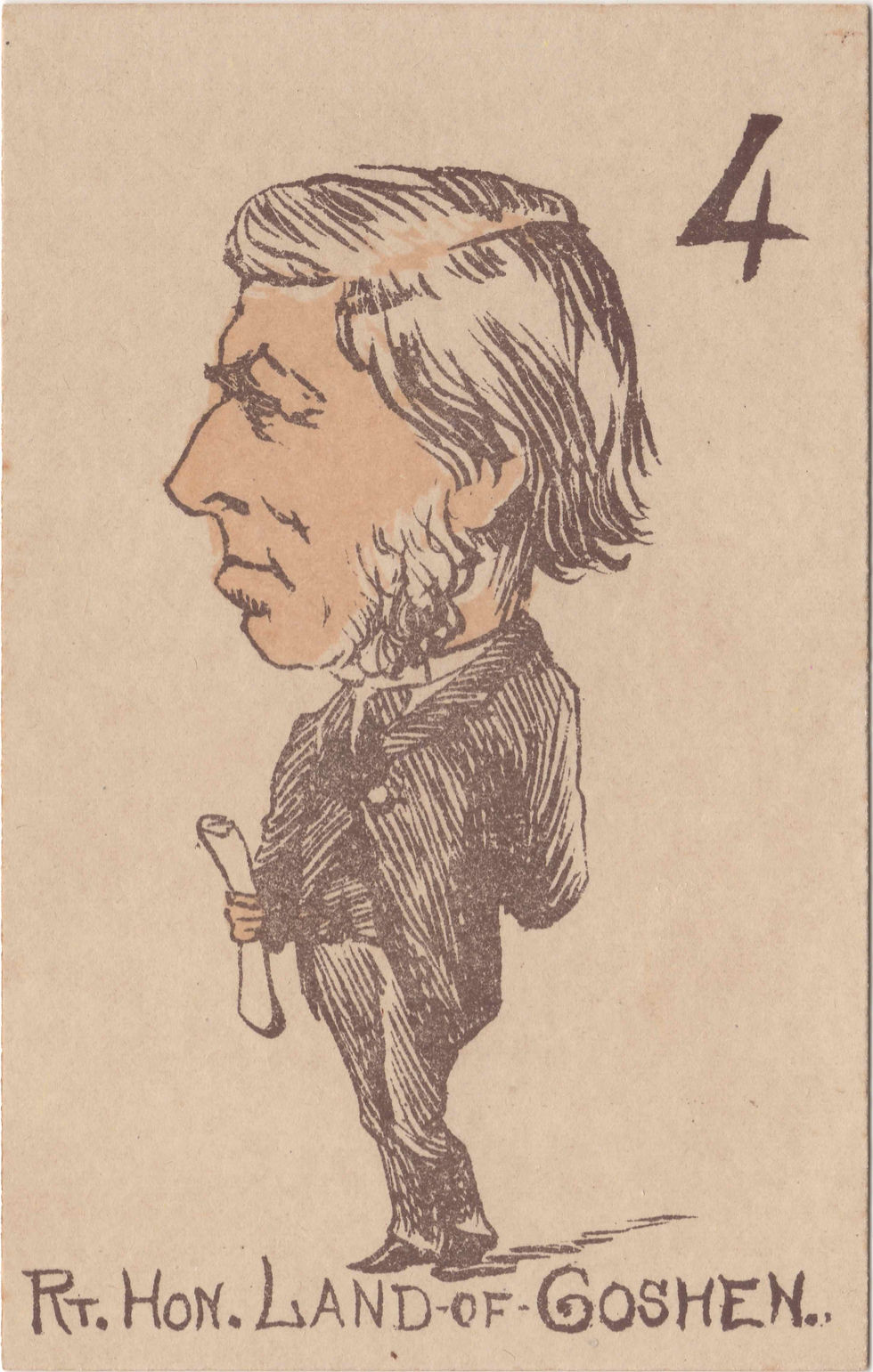 | 4 Rt. Hon. Land-of-Goshen George Joachim Goschen, 1st Viscount Goschen (1831-1907) MP for City of London 1863-1880, Ripon 1880-1885, Edinburgh East 1885-1886 & St George's Hanover Square 1887-1900. President of the Poor Law Board 1868-1871. First Lord of the Admiralty 1871-1874 & 1895-1900. As Chancellor of the Exchequer 1887-1892, he introduced the first road tax. |
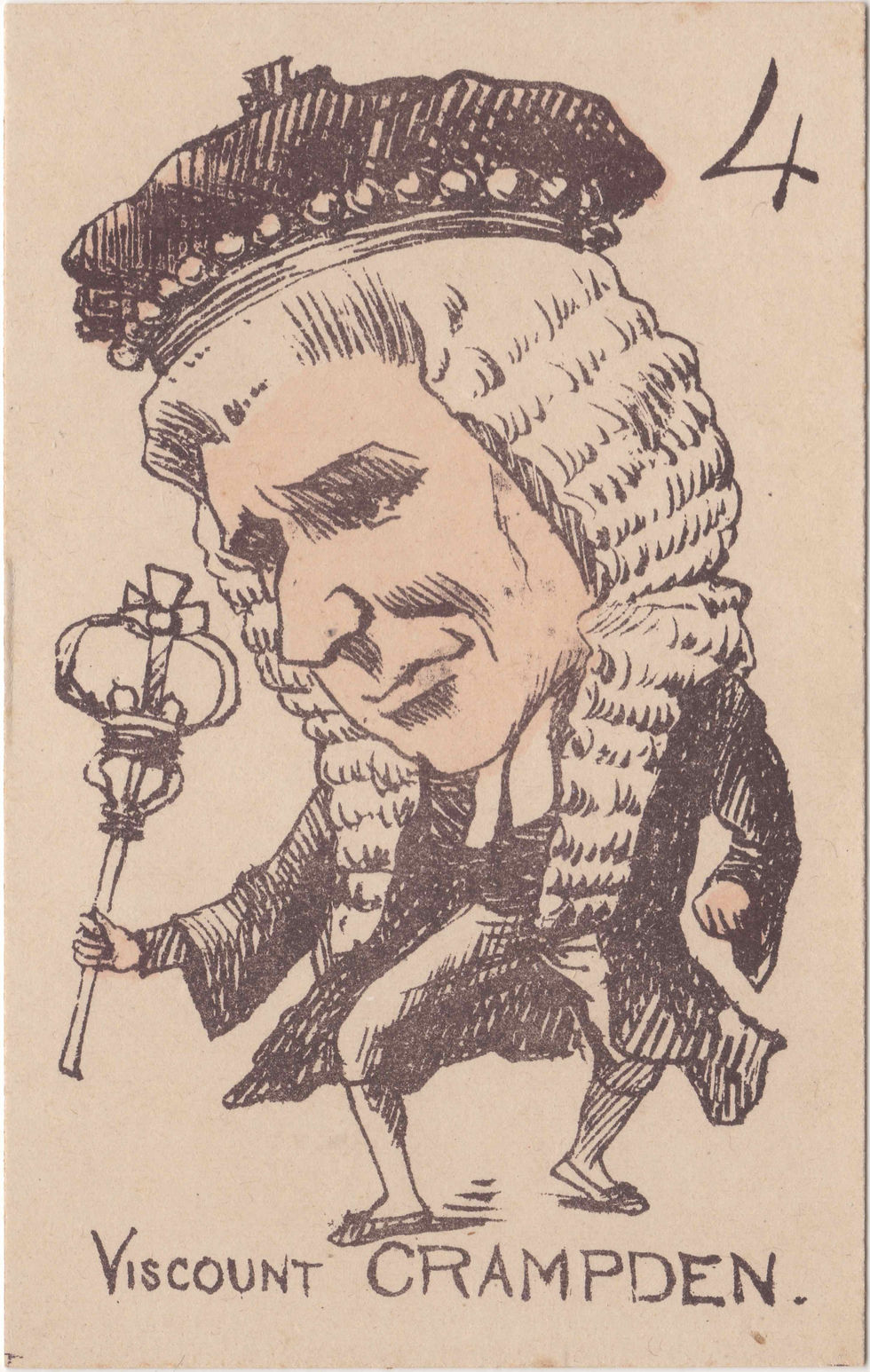 | 4 Viscount Crampden Robert Adam Philips Haldane Haldane-Duncan, 3rd Earl of Camperdown (1841–1918) However, Camperdown looks nothing like the caricature figure of Crampden. or Henry Robert Brand, 2nd Viscount Hampden (1841-1906) MP for for Hertfordshire 1868–1873 and for Stroud 1880–1886. Unsuccessfully stood as for Cardiff in 1886. Like Camperdown, Hamden looks nothing like the caricature Crampden. or Charles Crompton Q.C. (1883-1890) who was elected Member of MP for Leek in 1885. He lost the seat in 1886 and did not stand again. I can't find any image of him. or John Campbell, 1st Baron Campbell of St Andrews (1779-1861) Campbell's dates are wrong but he did serve as Lord Chancellor and his depiction in this role and his appearance, match the caricature. My guess is that the game's caricaturist was asked to draw the obscure newly elected Charles Crompton (or possibly the obscure MP Viscount Hampden) and confused his subject and visual sources with the far better known, but dead, Baron Campbell. The mistake, if one occurred, may well have gone unnoticed, or if spotted disregarded, on account of the equally brief and obscure parliamentary careers of Hampden or Crompton. |
 | 5 Lord Southbrook Thomas George Baring, 1st Earl of Northbrook (1826-1904) MP for Penryn and Falmouth 1857 until 1866, when he became a peer on the death of his father. Governor-General of India 1872–1876. First Lord of the Admiralty between 1880 and 1885. |
 | 6 Lord Dog-Rosebery Archibald Philip Primrose, 5th Earl of Rosebery (1847-1929) Rosebery was twice Foreign Secretary, 1886 and 1892-1894. He became the first chairman of the London County Council in 1889, Rosebery Avenue in Clerkenwell is named after him. He succeeded William Gladstone as Prime Minister and served 1894-1895. |
 | 6 Rt. Hon. Ugh Chilloff (1827-1896) MP for Pontefract 1860-1885, Edinburgh South 1885-1892. Civil Lord of the Admiralty in 1864, Financial Secretary to the Treasury in 1865, First Lord of the Admiralty 1868-1871. Secretary for War, 1880-1882, Chancellor of the Exchequer in 1882-1885, Home Secretary 1886. |
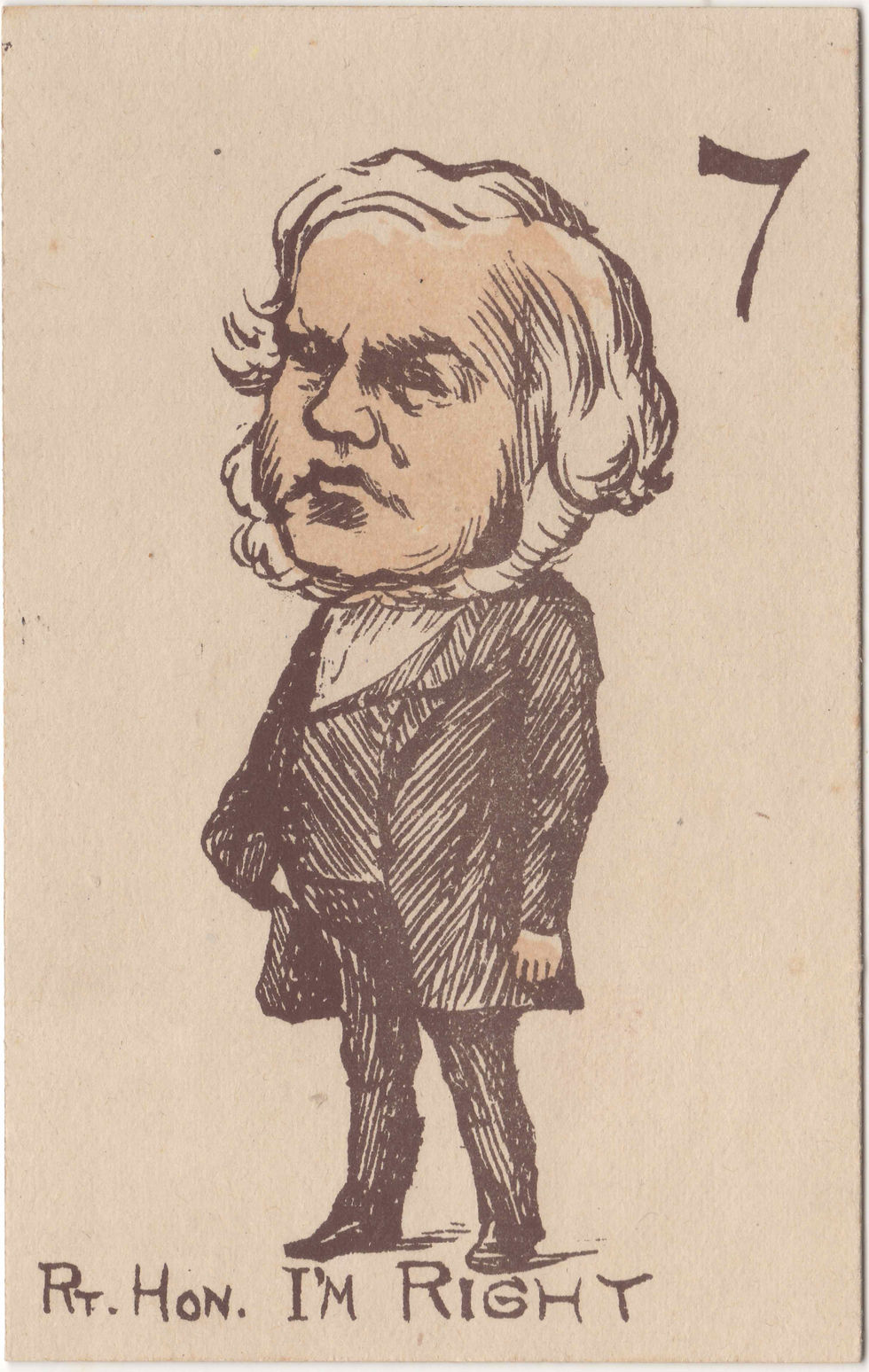 | 7 Rt Hon. I’m Right (1811-1889) MP for Stockport 1841-1843, Durham 1843-1847, Manchester 1847-1858 & Birmingham 1858-1889. An outstanding orator, Bright is credited with coining the phrase "flogging a dead horse" during parliamentary debates on democratic representation. |
 | 7 Lord Half-Hartington Spencer Cavendish, Marquess of Hartington (1858-91) Later, 8th Duke of Devonshire (1833-1908) Styled Lord Cavendish of Keighley between 1834 and 1858 and Marquess of Hartington between 1858 and 1891. He held leading positions in three different political parties, either in the House of Commons or the House of Lords; the Liberal Party, the Liberal Unionist Party and the Conservative Party. Margot Asquith said of the Duke that he "was a man whose like we shall never see again; he stood by himself and could have come from no country in the world but England. He had the figure and appearance of an artisan, with the brevity of a peasant, the courtesy of a king and the noisy sense of humour of a Falstaff.". |
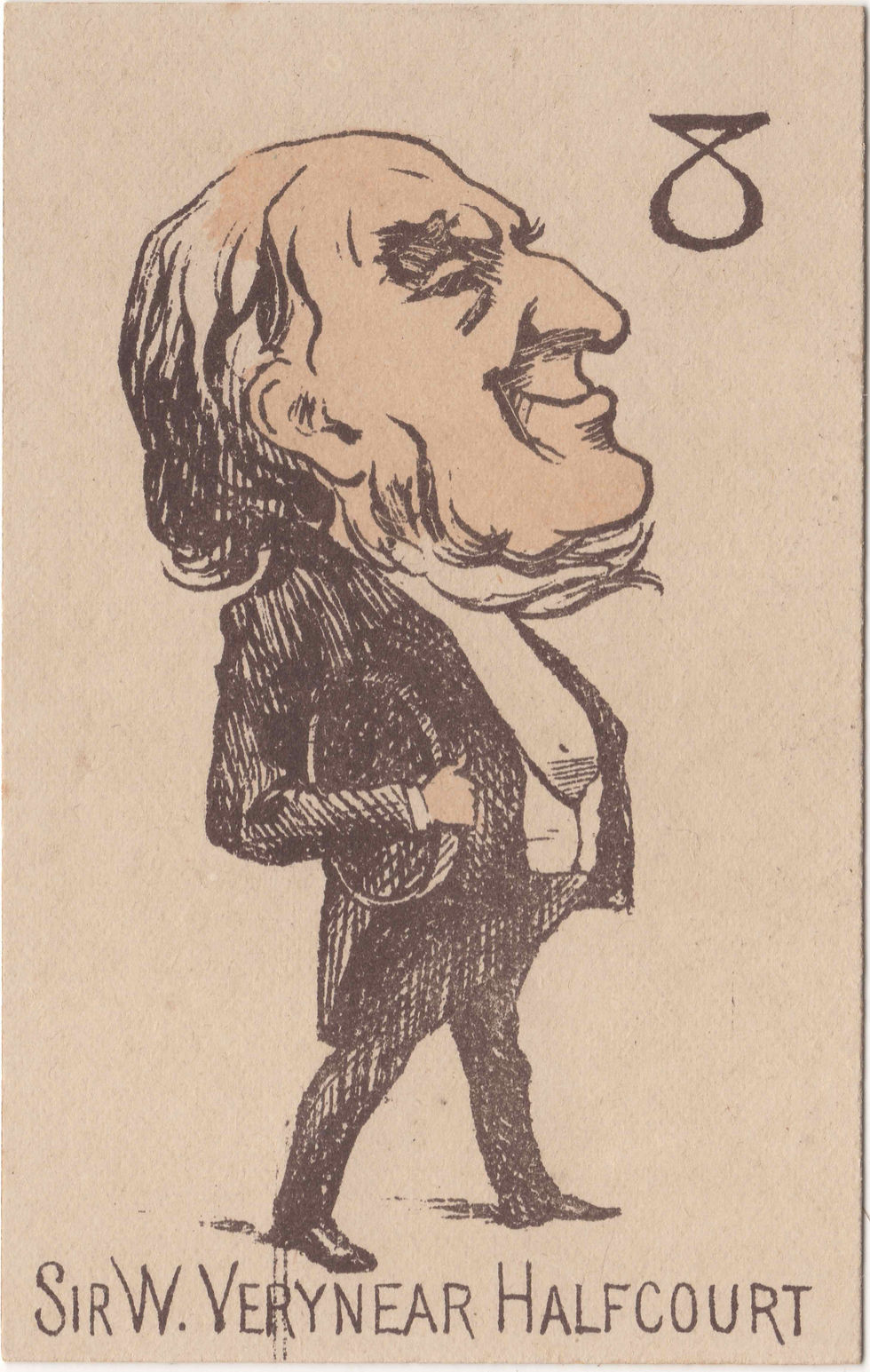 | 8 Sir W. Verynear Halfcourt (1827-1904) MP for Oxford 1868-1880, Derby 1880-1895 & West Monmouthshire 1895-1904. Solicitor General and knighted in 1873, Home Secretary 1880-1885, Chancellor of the Exchequer 1886 and 1892-1895. As Home Secretary he was the victim of two amusing but scandalous and embarrassing stunts, "The Harcourt Interpolation" and the "Home Office Baby". |
 | 9 Lord Grannysill Granville Leveson-Gower, 2nd Earl Granville (1815-1891) MP for Morpeth 1837-1840 and for Lichfield 1841 until 1846 when he succeeded to his father's title. Under-Secretary of State for Foreign Affairs 1840-1841. Vice-President of the Board of Trade in 1848, and took a prominent role in promoting the Great Exhibition of 1851. Lord President of the Council 1852-1854, 1855-1858 and 1859-1866. Secretary of State for the Colonies 1868-1870. |
 | 10 Rt. Hon. J. More-Or-Less John Morley, 1st Viscount Morley of Blackburn (1838-1923) MP for Newcastle upon Tyne 1883-1895 and Montrose Burghs 1896 until 1908 when he took a seat in the Lords. Chief Secretary for Ireland, 1886 & 1892–95. Secretary of State for India 1905-1910. Lord President of the Council 1910-1914. |
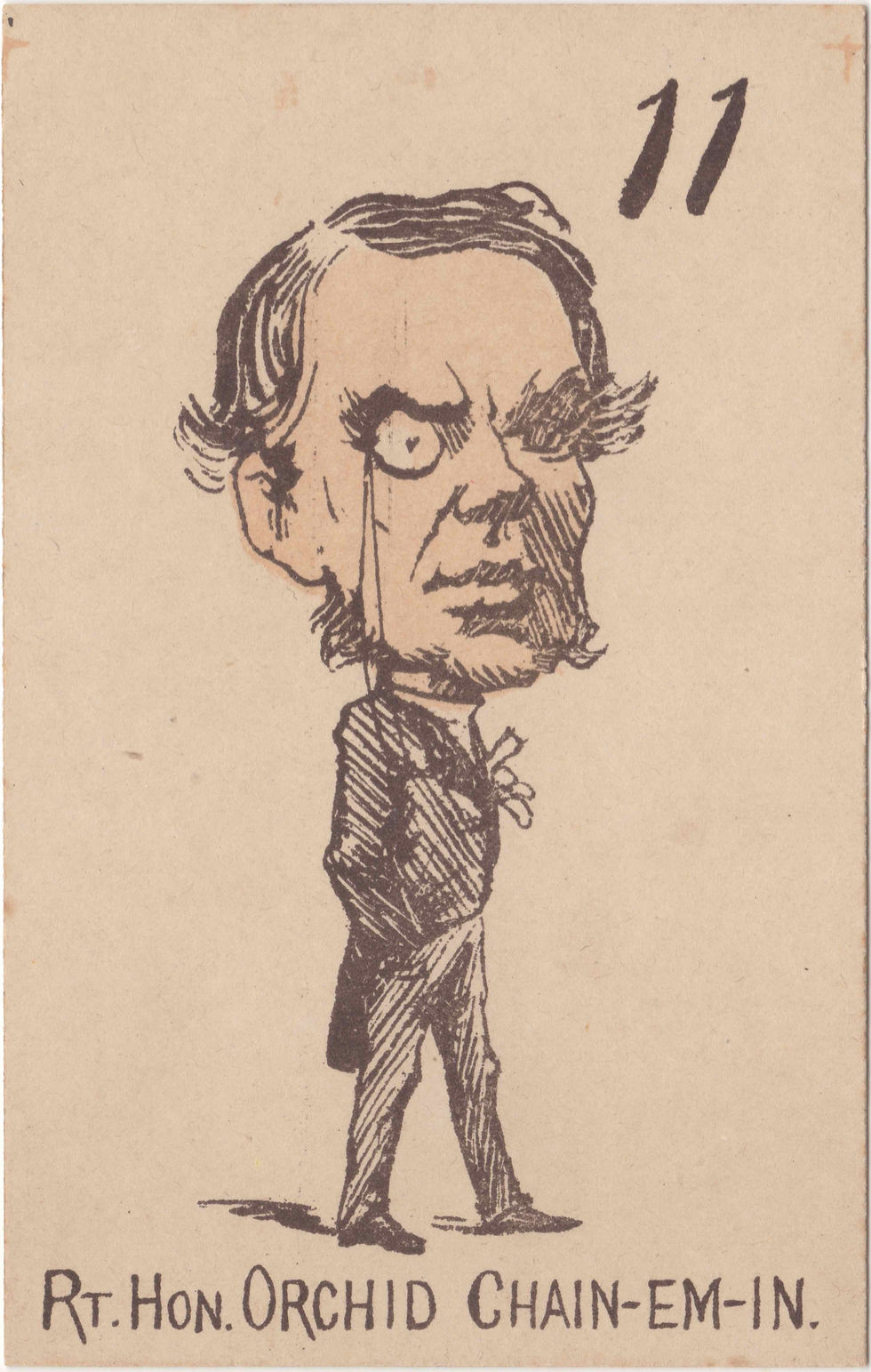 | 11 Rt.Hon.Orchid Chain-Em-In (1836-1914) Chamberlain caused splits in the Liberal and Conservative parties during his career. He was the father of Nobel Peace Prize winner Austen Chamberlain and of Prime Minister Neville Chamberlain. His fortune was made through the manufacture of ironmongery and he was fiercely opposed to Irish Home Rule, "Chain-em-In" may be a reference to either. A lover and grower of Orchids, the origin of his other epithet is clear. |
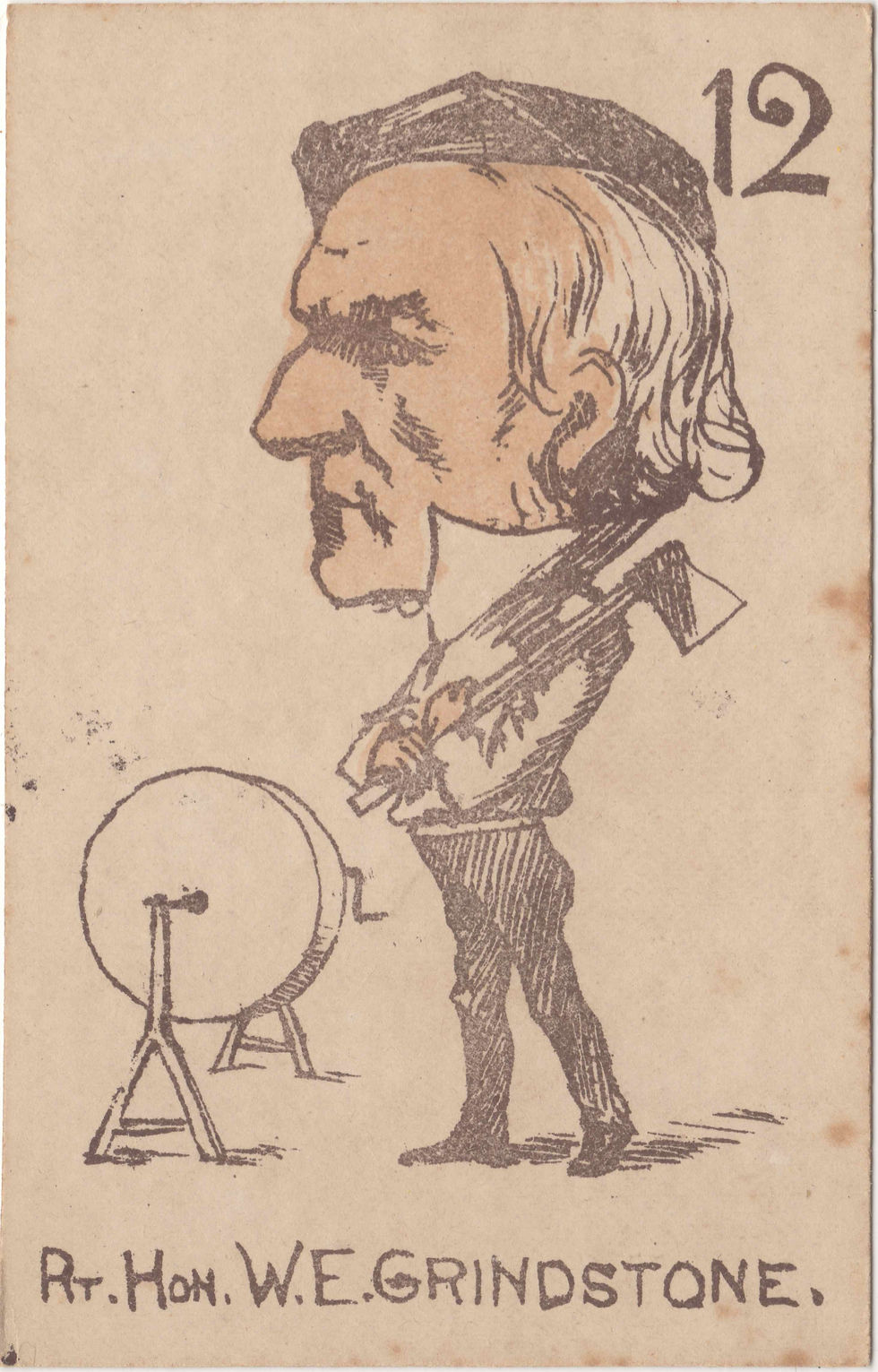 | 12 Rt Hon. W.E.Grindstone (1809-1898) In a career lasting over 60 years, Gladstone was Prime Minister four times and also four times Chancellor of the Exchequer, taken together he spent 24 years in one of the two highest offices of the state. |
Notes:
The game was printed by Hadlow of Brighton, their name is on the front of the box.
In A History of Playing Cards by Catherine Perry Hargreave (1966) Dover, there is a one line entry, recording that Henry Reason's Game of Parliament has 46 cards.
The British Museum holds an incomplete set of 45 cards in their Department of Prints and Drawings. Henry Reason's Game of Parliament at the BM
In the novel Beautiful Lies by Clare Clark (2012) Harville Secker, London, the game is briefly referred to, but not by name, .
"Taking a pack of cards from the drawer, he slid them from their box and shuffled them. They were a pack Edward had been given by a friend upon winning his seat in Parliament, the cards all had pen-and-ink caricatures of well known politicians. Joe Chamberlain's card was entitled The Rt. Hon. Orchid Chained-Em-In, the Baron de Worms's card the Baron de Caterpillar. Edward had studied the cards and declared himself duly warned. Campbell Lowe was a name that offered itself all too willingly to parody." p172
The English Playing Card Society's May 1993 Newsletter contains an article on the game by Dudley Ollis that cities earlier research by Stuart Lawrence who set out to identify the game's characters in the age before the DNB, NPG Catalogue, Who Was Who, Debrett's Peerage and Wikipedia became available online. I marvel at such dedication. I set myself the same challenge 30 years later and I had access to all those online resources yet still found the task challenging and at times frustrating.